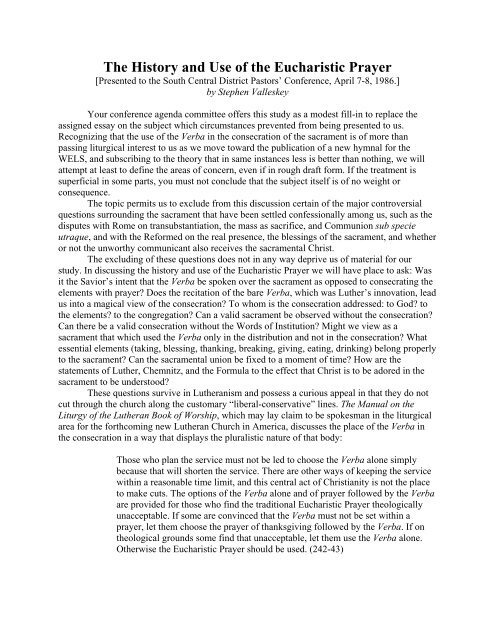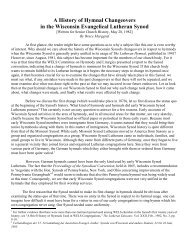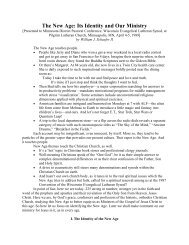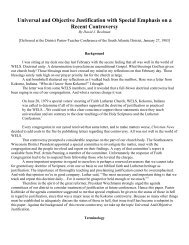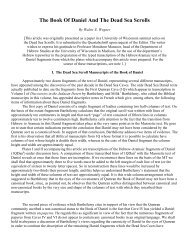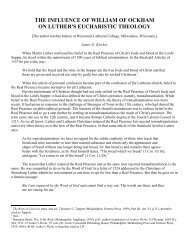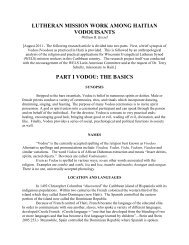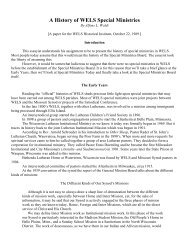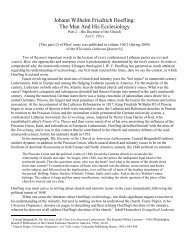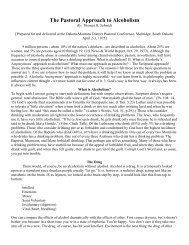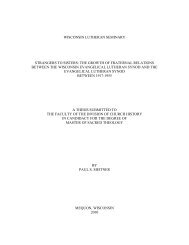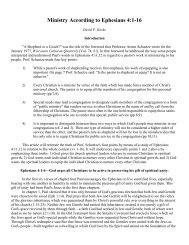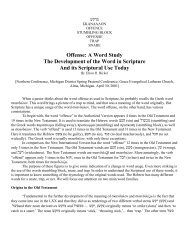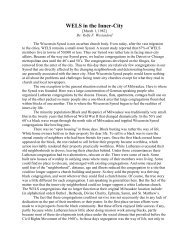The History and Use of the Eucharistic Prayer - Wisconsin Lutheran ...
The History and Use of the Eucharistic Prayer - Wisconsin Lutheran ...
The History and Use of the Eucharistic Prayer - Wisconsin Lutheran ...
Create successful ePaper yourself
Turn your PDF publications into a flip-book with our unique Google optimized e-Paper software.
<strong>The</strong> <strong>History</strong> <strong>and</strong> <strong>Use</strong> <strong>of</strong> <strong>the</strong> <strong>Eucharistic</strong> <strong>Prayer</strong><br />
[Presented to <strong>the</strong> South Central District Pastors’ Conference, April 7-8, 1986.]<br />
by Stephen Valleskey<br />
Your conference agenda committee <strong>of</strong>fers this study as a modest fill-in to replace <strong>the</strong><br />
assigned essay on <strong>the</strong> subject which circumstances prevented from being presented to us.<br />
Recognizing that <strong>the</strong> use <strong>of</strong> <strong>the</strong> Verba in <strong>the</strong> consecration <strong>of</strong> <strong>the</strong> sacrament is <strong>of</strong> more than<br />
passing liturgical interest to us as we move toward <strong>the</strong> publication <strong>of</strong> a new hymnal for <strong>the</strong><br />
WELS, <strong>and</strong> subscribing to <strong>the</strong> <strong>the</strong>ory that in same instances less is better than nothing, we will<br />
attempt at least to define <strong>the</strong> areas <strong>of</strong> concern, even if in rough draft form. If <strong>the</strong> treatment is<br />
superficial in some parts, you must not conclude that <strong>the</strong> subject itself is <strong>of</strong> no weight or<br />
consequence.<br />
<strong>The</strong> topic permits us to exclude from this discussion certain <strong>of</strong> <strong>the</strong> major controversial<br />
questions surrounding <strong>the</strong> sacrament that have been settled confessionally among us, such as <strong>the</strong><br />
disputes with Rome on transubstantiation, <strong>the</strong> mass as sacrifice, <strong>and</strong> Communion sub specie<br />
utraque, <strong>and</strong> with <strong>the</strong> Reformed on <strong>the</strong> real presence, <strong>the</strong> blessings <strong>of</strong> <strong>the</strong> sacrament, <strong>and</strong> whe<strong>the</strong>r<br />
or not <strong>the</strong> unworthy communicant also receives <strong>the</strong> sacramental Christ.<br />
<strong>The</strong> excluding <strong>of</strong> <strong>the</strong>se questions does not in any way deprive us <strong>of</strong> material for our<br />
study. In discussing <strong>the</strong> history <strong>and</strong> use <strong>of</strong> <strong>the</strong> <strong>Eucharistic</strong> <strong>Prayer</strong> we will have place to ask: Was<br />
it <strong>the</strong> Savior’s intent that <strong>the</strong> Verba be spoken over <strong>the</strong> sacrament as opposed to consecrating <strong>the</strong><br />
elements with prayer? Does <strong>the</strong> recitation <strong>of</strong> <strong>the</strong> bare Verba, which was Lu<strong>the</strong>r’s innovation, lead<br />
us into a magical view <strong>of</strong> <strong>the</strong> consecration? To whom is <strong>the</strong> consecration addressed: to God? to<br />
<strong>the</strong> elements? to <strong>the</strong> congregation? Can a valid sacrament be observed without <strong>the</strong> consecration?<br />
Can <strong>the</strong>re be a valid consecration without <strong>the</strong> Words <strong>of</strong> Institution? Might we view as a<br />
sacrament that which used <strong>the</strong> Verba only in <strong>the</strong> distribution <strong>and</strong> not in <strong>the</strong> consecration? What<br />
essential elements (taking, blessing, thanking, breaking, giving, eating, drinking) belong properly<br />
to <strong>the</strong> sacrament? Can <strong>the</strong> sacramental union be fixed to a moment <strong>of</strong> time? How are <strong>the</strong><br />
statements <strong>of</strong> Lu<strong>the</strong>r, Chemnitz, <strong>and</strong> <strong>the</strong> Formula to <strong>the</strong> effect that Christ is to be adored in <strong>the</strong><br />
sacrament to be understood?<br />
<strong>The</strong>se questions survive in Lu<strong>the</strong>ranism <strong>and</strong> possess a curious appeal in that <strong>the</strong>y do not<br />
cut through <strong>the</strong> church along <strong>the</strong> customary “liberal-conservative” lines. <strong>The</strong> Manual on <strong>the</strong><br />
Liturgy <strong>of</strong> <strong>the</strong> Lu<strong>the</strong>ran Book <strong>of</strong> Worship, which may lay claim to be spokesman in <strong>the</strong> liturgical<br />
area for <strong>the</strong> forthcoming new Lu<strong>the</strong>ran Church in America, discusses <strong>the</strong> place <strong>of</strong> <strong>the</strong> Verba in<br />
<strong>the</strong> consecration in a way that displays <strong>the</strong> pluralistic nature <strong>of</strong> that body:<br />
Those who plan <strong>the</strong> service must not be led to choose <strong>the</strong> Verba alone simply<br />
because that will shorten <strong>the</strong> service. <strong>The</strong>re are o<strong>the</strong>r ways <strong>of</strong> keeping <strong>the</strong> service<br />
within a reasonable time limit, <strong>and</strong> this central act <strong>of</strong> Christianity is not <strong>the</strong> place<br />
to make cuts. <strong>The</strong> options <strong>of</strong> <strong>the</strong> Verba alone <strong>and</strong> <strong>of</strong> prayer followed by <strong>the</strong> Verba<br />
are provided for those who find <strong>the</strong> traditional <strong>Eucharistic</strong> <strong>Prayer</strong> <strong>the</strong>ologically<br />
unacceptable. If some are convinced that <strong>the</strong> Verba must not be set within a<br />
prayer, let <strong>the</strong>m choose <strong>the</strong> prayer <strong>of</strong> thanksgiving followed by <strong>the</strong> Verba. If on<br />
<strong>the</strong>ological grounds some find that unacceptable, let <strong>the</strong>m use <strong>the</strong> Verba alone.<br />
O<strong>the</strong>rwise <strong>the</strong> <strong>Eucharistic</strong> <strong>Prayer</strong> should be used. (242-43)
While we may not agree with what <strong>the</strong>y think is <strong>the</strong>ological <strong>and</strong> what not, we will let that pass<br />
for <strong>the</strong> moment <strong>and</strong> simply note that what <strong>the</strong> Manual is saying is: 1) <strong>The</strong>y do not think that <strong>the</strong><br />
sacrament should be consecrated by <strong>the</strong> minister’s recitation <strong>of</strong> <strong>the</strong> bare Verba, which has been<br />
<strong>the</strong> general Lu<strong>the</strong>ran usage since <strong>the</strong> Reformation. Elsewhere <strong>the</strong>y say that if <strong>the</strong> bare Verba<br />
must be used, at least we should “consider chanting <strong>the</strong>se words so that something <strong>of</strong> <strong>the</strong> spirit <strong>of</strong><br />
praise be retained <strong>and</strong> so that this part <strong>of</strong> <strong>the</strong> Eucharist not pass by <strong>the</strong> congregation too quickly”<br />
(242). 2) If <strong>the</strong> full <strong>Eucharistic</strong> <strong>Prayer</strong> is not to be used, <strong>the</strong>n it is best to precede <strong>the</strong> recitation <strong>of</strong><br />
<strong>the</strong> Verba with prayer (<strong>the</strong>ir suggested “<strong>Prayer</strong> <strong>of</strong> Thanksgiving”), which is <strong>the</strong> LC–MS Lu<strong>the</strong>ran<br />
Worship solution. 3) But to be preferred is <strong>the</strong> use <strong>of</strong> <strong>the</strong> historic <strong>Eucharistic</strong> <strong>Prayer</strong>, which<br />
incorporates <strong>the</strong> Verba into <strong>the</strong> prayer.<br />
So it is clear that new Lu<strong>the</strong>ranism in America has a problem with <strong>the</strong> use <strong>of</strong> <strong>the</strong> Verba in<br />
<strong>the</strong> consecration, <strong>and</strong> has resigned itself to a variety <strong>of</strong> practices (<strong>the</strong>ologies?) regarding <strong>the</strong>ir<br />
use. To what degree this issue is also a concern to us is <strong>the</strong> focus <strong>of</strong> this paper.<br />
<strong>The</strong> <strong>History</strong><br />
<strong>The</strong> starting point for any discussion <strong>of</strong> <strong>the</strong> Lord’s Supper must be <strong>the</strong> upper room in<br />
Jerusalem on <strong>the</strong> night in which our Lord was betrayed. Was <strong>the</strong>re an action or words spoken<br />
<strong>the</strong>re that we can identify in <strong>the</strong> gospels or in Paul as a consecratory act? <strong>The</strong> recitation <strong>of</strong> <strong>the</strong><br />
Verba, which for us today constitutes <strong>the</strong> consecration, was done by Jesus in <strong>the</strong> distribution, as<br />
he gave (δούς, Mat<strong>the</strong>w 26:26; ἔδοκεν, Mat<strong>the</strong>w 26:27; Mark 16:22-23; Luke 22:19) <strong>the</strong> elements<br />
to <strong>the</strong> disciples.<br />
Where does <strong>the</strong> idea <strong>of</strong> a separate blessing or consecration <strong>of</strong> <strong>the</strong> elements originate? <strong>The</strong><br />
consecration is that which we find in <strong>the</strong> sacred text in <strong>the</strong> words εὐλογεῖν (Mat<strong>the</strong>w 26:26; Mark<br />
14:22) <strong>and</strong> εὐχαριστεῖν (Mat<strong>the</strong>w 26:27; Mark 14:23; Luke 19:22; 1 Corinthians 11:24), both <strong>of</strong><br />
which are generally translated into English throughout as “gave thanks.” This action <strong>of</strong> our<br />
Savior <strong>of</strong> εὐλογεῖν or εὐχαριστεῖν took place after taking <strong>the</strong> bread <strong>and</strong> before breaking it <strong>and</strong><br />
giving it to <strong>the</strong> disciples, <strong>and</strong> again after taking <strong>the</strong> cup <strong>and</strong> before <strong>of</strong>fering it to <strong>the</strong> disciples. So<br />
here we have in <strong>the</strong> original institution <strong>of</strong> <strong>the</strong> sacrament an action <strong>of</strong> blessing or giving thanks<br />
that occurred apart from <strong>and</strong> before <strong>the</strong> distribution <strong>of</strong> <strong>the</strong> elements.<br />
<strong>The</strong> apostle Paul presents us with special consideration when he writes to <strong>the</strong> Corinthians<br />
<strong>of</strong> “<strong>the</strong> cup <strong>of</strong> blessing which we bless” (1 Corinthians 10:16), which <strong>the</strong> NIV in <strong>the</strong> interest <strong>of</strong><br />
uniformity translates: “<strong>the</strong> cup <strong>of</strong> thanksgiving for which we give thanks.” <strong>The</strong> Greek reads, “<strong>the</strong><br />
cup <strong>of</strong> εὐλογίας which we εὐλογούμενον.” A variant reading not well attested has “<strong>the</strong> cup <strong>of</strong><br />
εὐχαριστίας which we εὐλογούμενον.” <strong>The</strong> NIV translation is inadequate <strong>and</strong> lends itself unduly<br />
to an underst<strong>and</strong>ing <strong>of</strong> a sacrament in which <strong>the</strong>re is no consecration. Of <strong>the</strong> nine English<br />
versions in my library only <strong>the</strong> NIV excludes <strong>the</strong> idea <strong>of</strong> blessing from this passage. If <strong>the</strong> two<br />
verbs εὐχαριστεῖν <strong>and</strong> εὐλογεῖν are used almost interchangeably in <strong>the</strong> narratives <strong>of</strong> <strong>the</strong> institution<br />
<strong>of</strong> <strong>the</strong> Lord’s Supper, which does in fact appear to be <strong>the</strong> case since both Mat<strong>the</strong>w <strong>and</strong> Mark<br />
speak <strong>of</strong> <strong>the</strong> action <strong>of</strong> Christ after taking bread <strong>and</strong> before breaking it as <strong>the</strong> εὐλογεῖν, while Luke<br />
<strong>and</strong> St. Paul speak <strong>of</strong> <strong>the</strong> identical action as εὐχαριστεῖν, it by no means follows that εὐλογεῖν<br />
takes on entirely <strong>the</strong> meaning <strong>of</strong> εὐχαριστεῖν while <strong>the</strong> sense <strong>of</strong> εὐχαριστεῖν remains unchanged.<br />
εὐλογεῖν is <strong>the</strong> common word in <strong>the</strong> LXX <strong>and</strong> Greek New Testament for “to bless or consecrate.”
When applied to table prayer, εὐλογεῖν ought no more to be limited to <strong>the</strong> thanksgiving element<br />
in that prayer than “asking <strong>the</strong> blessing” at table today would be construed as only a giving <strong>of</strong><br />
thanks. If εὐλογεῖν taxes on some <strong>of</strong> <strong>the</strong> sense <strong>of</strong> εὐχαριστεῖν through <strong>the</strong>ir interchangeable use in<br />
<strong>the</strong> institution <strong>of</strong> <strong>the</strong> sacrament, <strong>the</strong>n <strong>the</strong> o<strong>the</strong>r side must also be true that εὐχαριστεῖν taxes on<br />
some <strong>of</strong> <strong>the</strong> basic meaning <strong>of</strong> εὐλογεῖν in this context.<br />
In what does <strong>the</strong> εὐλογεῖν consist? For Chemnitz it is axiomatic that for us today <strong>the</strong><br />
εὐλογεῖν = <strong>the</strong> consecration = <strong>the</strong> Words <strong>of</strong> Institution, for we have no o<strong>the</strong>r word from God by<br />
which <strong>the</strong> sacramental presence is established. “This addition <strong>of</strong> <strong>the</strong> Word to <strong>the</strong> element in <strong>the</strong><br />
sacraments is called ‘sanctification’ by <strong>the</strong> ancients. <strong>The</strong> common people call it ‘consecration.’<br />
Paul, following <strong>the</strong> description <strong>of</strong> Mark, calls it ‘blessing’ when he says: ‘<strong>The</strong> cup <strong>of</strong> blessing<br />
which we bless’ (1 Corinthians 10:16)” (Examen, II,225). Any attempt to substitute human<br />
words for <strong>the</strong> divine word <strong>of</strong> institution, or to mix <strong>the</strong> human with <strong>the</strong> divine, is to be repudiated:<br />
“He acts wickedly who takes away <strong>the</strong> consecration <strong>of</strong> <strong>the</strong> Eucharist from <strong>the</strong> words <strong>of</strong> divine<br />
institution <strong>and</strong> transfers it to <strong>the</strong> prayers <strong>of</strong> <strong>the</strong> canon, which have been patched toge<strong>the</strong>r by<br />
men… And surely this blessing or consecration is not to be divided between <strong>the</strong> Word <strong>of</strong> God<br />
<strong>and</strong> words h<strong>and</strong>ed down by men” (Examen, II,226).<br />
But we must ask also in what <strong>the</strong> blessing or consecration <strong>of</strong> Christ consisted in <strong>the</strong> first<br />
celebration <strong>of</strong> <strong>the</strong> Lord’s Supper? This we cannot know with certainty. Since both Mat<strong>the</strong>w <strong>and</strong><br />
Mark record that <strong>the</strong> institution occurred “while <strong>the</strong>y were eating,” we do not doubt that <strong>the</strong><br />
blessing took place before <strong>the</strong> Passover supper was completed <strong>and</strong> was in all likelihood a part <strong>of</strong><br />
that supper. Paul’s calling <strong>the</strong> cup “<strong>the</strong> cup <strong>of</strong> blessing” (1 Corinthians 10:16) supports this<br />
analysis, for <strong>the</strong> third cup <strong>of</strong> <strong>the</strong> Passover, which was filled at <strong>the</strong> close <strong>of</strong> <strong>the</strong> supper, bears <strong>the</strong><br />
very designation “cup <strong>of</strong> blessing,” one <strong>of</strong> <strong>the</strong> ten essential rites <strong>of</strong> <strong>the</strong> Passover meal<br />
(Edersheim). Joachim Jeremias <strong>of</strong>fers a substantial weight <strong>of</strong> evidence that <strong>the</strong> Lord’s Supper<br />
originated as part <strong>of</strong> <strong>the</strong> Passover meal, <strong>and</strong> that <strong>the</strong> institution <strong>of</strong> <strong>the</strong> cup took place in<br />
connection with <strong>the</strong> third cup <strong>of</strong> blessing (Jeremias, 41-84).<br />
As to <strong>the</strong> host, Edersheim can find nothing in <strong>the</strong> historic Passover that corresponds with<br />
Jesus’ breaking <strong>of</strong> <strong>the</strong> bread <strong>and</strong> its blessing, but suggests that Jesus here “anticipates” <strong>the</strong> later<br />
Jewish practice <strong>of</strong> <strong>the</strong> aphikomon that was introduced after <strong>the</strong> destruction <strong>of</strong> <strong>the</strong> Temple when<br />
<strong>the</strong> paschal as well as all o<strong>the</strong>r sacrifices ceased. So long as <strong>the</strong> paschal lamb was still <strong>of</strong>fered, he<br />
notes, it was forbidden to eat anything else after partaking <strong>of</strong> its flesh. But with <strong>the</strong> cessation <strong>of</strong><br />
<strong>the</strong> sacrifice <strong>of</strong> <strong>the</strong> paschal lamb it has become <strong>the</strong> custom after <strong>the</strong> meal to eat <strong>the</strong> aphikomon,<br />
<strong>the</strong> half <strong>of</strong> <strong>the</strong> unleavened cake that was set aside at <strong>the</strong> beginning <strong>of</strong> <strong>the</strong> meal. Jesus did this very<br />
thing in <strong>the</strong> upper room “anticipating <strong>the</strong> later custom,” Edersheim believes, because in truth this<br />
was <strong>the</strong> last Passover (Edersheim, II,311).<br />
If in fact it can be demonstrated that <strong>the</strong> eating <strong>of</strong> <strong>the</strong> bread <strong>of</strong> <strong>the</strong> Lord’s Supper<br />
corresponds to <strong>the</strong> aphikomon, this does not help us in our quest for Jesus’ words <strong>of</strong> blessing<br />
spoken over <strong>the</strong> bread since <strong>the</strong>y would have been an addendum to <strong>the</strong> ordinary celebration <strong>of</strong><br />
<strong>the</strong> Passover. <strong>The</strong> blessing <strong>of</strong> <strong>the</strong> cup, on <strong>the</strong> o<strong>the</strong>r h<strong>and</strong>, if we may identify it with <strong>the</strong> third cup<br />
<strong>of</strong> <strong>the</strong> Passover, can be traced with some certainty <strong>and</strong> minor variations to <strong>the</strong> second century in<br />
<strong>the</strong> birkath hammazon <strong>of</strong> <strong>the</strong> Passover which, with <strong>the</strong> exception <strong>of</strong> <strong>the</strong> fourth section that was<br />
added sometime after <strong>the</strong> fall <strong>of</strong> Jerusalem in 70 AD, is thought for <strong>the</strong> most part to have been at<br />
least contemporary with <strong>the</strong> lifetime <strong>of</strong> Jesus. Some scholars believe this prayer to be a possible
ultimate source <strong>of</strong> <strong>the</strong> Christian <strong>Eucharistic</strong> <strong>Prayer</strong> (Jeremias, 86). <strong>The</strong> text is from <strong>Prayer</strong>s <strong>of</strong> <strong>the</strong><br />
Eucharist, 9-10:<br />
Birkath Hammazon<br />
Blessing <strong>of</strong> him who nourishes<br />
Blessed are you, Lord our God, King <strong>of</strong> <strong>the</strong> universe, for you nourish us<br />
<strong>and</strong> <strong>the</strong> whole world with goodness, grace, kindness <strong>and</strong> mercy.<br />
Blessed are you, Lord, for you nourish <strong>the</strong> universe.<br />
Blessing for <strong>the</strong> earth<br />
We will give thanks to you, Lord our God, because you have given us for<br />
our inheritance a desirable l<strong>and</strong>, good <strong>and</strong> wide, <strong>the</strong> covenant <strong>and</strong> <strong>the</strong><br />
law, life <strong>and</strong> food.<br />
(On <strong>the</strong> feasts <strong>of</strong> Hanukkah <strong>and</strong> Purim, here follows an<br />
embolism.)<br />
And for all <strong>the</strong>se things we give you thanks <strong>and</strong> bless your name<br />
for ever <strong>and</strong> beyond.<br />
Blessed are you, Lord our God, for <strong>the</strong> earth <strong>and</strong> for food.<br />
Blessing for Jerusalem<br />
Have mercy, Lord our God, on us your people Israel, <strong>and</strong> your city<br />
Jerusalem, on your sanctuary <strong>and</strong> your dwelling-place, on Zion, <strong>the</strong><br />
habitation <strong>of</strong> your glory, <strong>and</strong> <strong>the</strong> great <strong>and</strong> holy house over which your<br />
name is invoked. Restore <strong>the</strong> kingdom <strong>of</strong> <strong>the</strong> house <strong>of</strong> David to its place<br />
in our days, <strong>and</strong> speedily build Jerusalem.<br />
(On <strong>the</strong> feast <strong>of</strong> Passover, here follows this embolism:<br />
Our God <strong>and</strong> God <strong>of</strong> our fa<strong>the</strong>rs, may <strong>the</strong>re arise in your sight,<br />
<strong>and</strong> come, <strong>and</strong> be present, <strong>and</strong> be regarded, <strong>and</strong> be pleasing, <strong>and</strong> be<br />
heard, <strong>and</strong> be visited, <strong>and</strong> be remembered our remembrance <strong>and</strong> our<br />
visitation, <strong>and</strong> <strong>the</strong> remembrance <strong>of</strong> our fa<strong>the</strong>rs, <strong>and</strong> <strong>the</strong> remembrance <strong>of</strong><br />
<strong>the</strong> Messiah, <strong>the</strong> son <strong>of</strong> your servant David, <strong>and</strong> <strong>the</strong> remembrance <strong>of</strong><br />
Jerusalem, <strong>the</strong> city <strong>of</strong> your holiness, <strong>and</strong> <strong>the</strong> remembrance <strong>of</strong> all your<br />
people, <strong>the</strong> house <strong>of</strong> Israel: for escape, for prosperity, for grace, <strong>and</strong> for<br />
loving-kindness <strong>and</strong> merry, for life <strong>and</strong> for peace, on this day <strong>of</strong> <strong>the</strong> Feast<br />
<strong>of</strong> Unleavened Bread. Remember us on this day, Lord our God, for<br />
prosperity, <strong>and</strong> visit us on it for blessing, <strong>and</strong> save us on it for life. And<br />
by <strong>the</strong> word <strong>of</strong> salvation <strong>and</strong> mercy spare us, <strong>and</strong> grant us grace, <strong>and</strong><br />
have mercy on us, <strong>and</strong> save us: for our eyes look to you, for you, O God,<br />
are a gracious <strong>and</strong> merciful king.<br />
Blessed are you, Lord, for you build Jerusalem. Amen.)<br />
Blessing <strong>of</strong> <strong>the</strong> good <strong>and</strong> beneficent<br />
Blessed are you, Lord our God, King <strong>of</strong> <strong>the</strong> universe, God, our fa<strong>the</strong>r,<br />
our king, our creator, our redeemer, good <strong>and</strong> beneficent king, who day<br />
by day is concerned to benefit us in many ways, <strong>and</strong> himself will<br />
increase us for ever in grace <strong>and</strong> kindness <strong>and</strong> spirit <strong>and</strong> mercy <strong>and</strong> every<br />
good thing.<br />
It must be recognized that even if Jesus did speak <strong>the</strong> birkath hammazon over <strong>the</strong> cup, we<br />
do not know that he did not add also a specific blessing for <strong>the</strong> consecration <strong>of</strong> <strong>the</strong> cup <strong>of</strong> <strong>the</strong>
new Supper. And in fact he had to introduce a separate, non-Passover blessing for <strong>the</strong> bread <strong>of</strong><br />
<strong>the</strong> sacrament since nothing corresponding to it existed in <strong>the</strong> Passover ritual. Finally it must be<br />
said that regardless <strong>of</strong> <strong>the</strong> particular form <strong>of</strong> blessing Jesus spoke over <strong>the</strong> bread <strong>and</strong> wine at <strong>the</strong><br />
institution <strong>of</strong> <strong>the</strong> Supper, <strong>the</strong> consecratory power is not to be sought elsewhere than in <strong>the</strong> words<br />
that have come to us that effectively created <strong>the</strong> real presence <strong>of</strong> Christ in <strong>the</strong> first Supper <strong>and</strong> for<br />
all time wherever <strong>the</strong> true sacrament is observed, when Jesus said, “This is my body. This is my<br />
blood.”<br />
<strong>The</strong> earliest post-biblical record <strong>of</strong> a Communion celebration is found in <strong>the</strong> Didache.<br />
This includes instructions for a brief “thanksgiving” to be made over <strong>the</strong> wine <strong>and</strong> over <strong>the</strong> bread<br />
(Goodspeed, chap. 9, 15). <strong>The</strong> Words <strong>of</strong> Institution are not mentioned. Also Justin Martyr<br />
(c.150) speaks <strong>of</strong> <strong>the</strong> thanksgiving prayer that is made over <strong>the</strong> bread <strong>and</strong> <strong>the</strong> wine, <strong>and</strong> <strong>the</strong>n<br />
makes separate reference to <strong>the</strong> Words <strong>of</strong> Institution to explain why Christians do what <strong>the</strong>y do<br />
in <strong>the</strong> sacrament (First Apology, 65-66; in <strong>Prayer</strong>s <strong>of</strong> <strong>the</strong> Eucharist, 17-20). <strong>The</strong> failure <strong>of</strong> <strong>the</strong><br />
Didache <strong>and</strong> Justin Martyr to specifically mention <strong>the</strong> Words <strong>of</strong> Institution in <strong>the</strong>ir description <strong>of</strong><br />
<strong>the</strong> Communion rite cannot be used to argue that <strong>the</strong> Verba were absent from Lord’s Supper<br />
observance in <strong>the</strong> first century <strong>and</strong> a half <strong>of</strong> <strong>the</strong> Christian era. <strong>The</strong>se are not detailed liturgical<br />
descriptions. That Paul includes <strong>the</strong> Words <strong>of</strong> Institution in writing <strong>of</strong> <strong>the</strong> Lord’s Supper to <strong>the</strong><br />
Corinthians (1 Corinthians 11:23-26) in almost identical words to those we find in <strong>the</strong><br />
evangelists is strong evidence that from <strong>the</strong> beginning <strong>the</strong>y were a known <strong>and</strong> accepted formula<br />
in <strong>the</strong> church.<br />
And in fact <strong>the</strong> Apostolic Tradition <strong>of</strong> Hippolytus ( 223), thought to represent practice in<br />
Rome <strong>of</strong> possibly fifty years before its writing <strong>and</strong> <strong>the</strong>refore taking us back to about <strong>the</strong> time <strong>of</strong><br />
Justin, includes a fully developed <strong>Eucharistic</strong> <strong>Prayer</strong> that features <strong>the</strong> Verba as a prominent part<br />
<strong>of</strong> its thanksgiving. Already at this early date this prayer displays <strong>the</strong> four elements in order <strong>of</strong> 1)<br />
thanksgiving, 2) institution narrative, 3) anamnesis (remembrance), <strong>and</strong> 4) epiclesis (invocation<br />
<strong>of</strong> <strong>the</strong> Holy Spirit) that were to characterize all later prayers. We give <strong>the</strong> text from <strong>Prayer</strong>s <strong>of</strong><br />
<strong>the</strong> Eucharist, 22:<br />
<strong>The</strong> Apostolic Tradition<br />
<strong>The</strong>n <strong>the</strong> deacon shall present <strong>the</strong> <strong>of</strong>fering to him; <strong>and</strong> he, laying<br />
his h<strong>and</strong>s on it with all <strong>the</strong> presbytery, shall say, giving thanks:<br />
<strong>The</strong> Lord be with you.<br />
And all shall say:<br />
And with your spirit.<br />
Up with your hearts.<br />
We have <strong>the</strong>m with <strong>the</strong> Lord.<br />
Let us give thanks to <strong>the</strong> Lord.<br />
It is fitting <strong>and</strong> right.<br />
And <strong>the</strong>n he shall continue thus:<br />
We render thanks to you, O God, through your beloved child<br />
Jesus Christ, whom in <strong>the</strong> last times you sent to us as saviour <strong>and</strong><br />
redeemer <strong>and</strong> angel <strong>of</strong> your will;<br />
who is your inseparable Word, through whom you made all<br />
things, <strong>and</strong> in whom you were well pleased.<br />
You sent him from heaven into <strong>the</strong> Virgin’s womb; <strong>and</strong>,<br />
conceived in <strong>the</strong> womb, he was made flesh <strong>and</strong> was manifested as your<br />
Son, being born <strong>of</strong> <strong>the</strong> Holy Spirit <strong>and</strong> <strong>the</strong> Virgin.
Fulfilling your will <strong>and</strong> gaining for you a holy people, he<br />
stretched out his h<strong>and</strong>s when he should suffer, that he might release from<br />
suffering those who have believed in you.<br />
And when he was betrayed to voluntary suffering that he might<br />
destroy death, <strong>and</strong> break <strong>the</strong> bonds <strong>of</strong> <strong>the</strong> devil, <strong>and</strong> tread down hell, <strong>and</strong><br />
shine upon <strong>the</strong> righteous, <strong>and</strong> fix <strong>the</strong> limit, <strong>and</strong> manifest <strong>the</strong> resurrection,<br />
he took bread <strong>and</strong> gave thanks to you saying, “Take, eat; this<br />
is my body, which shall be broken for you.” Likewise also <strong>the</strong> cup,<br />
saying, “This is my blood, which is shed for you;<br />
when you do this, you make my remembrance.”<br />
Remembering <strong>the</strong>refore his death <strong>and</strong> resurrection, we <strong>of</strong>fer to<br />
you <strong>the</strong> bread <strong>and</strong> <strong>the</strong> cup, giving you thanks because you have held us<br />
worthy to st<strong>and</strong> before you <strong>and</strong> minister to you.<br />
And we ask that you would send your Holy Spirit upon <strong>the</strong><br />
<strong>of</strong>fering <strong>of</strong> your holy Church; that, ga<strong>the</strong>ring <strong>the</strong>m into one, you would<br />
grant to all who partake <strong>of</strong> <strong>the</strong> holy things (to partake) for <strong>the</strong> fullness <strong>of</strong><br />
<strong>the</strong> Holy Spirit for <strong>the</strong> confirmation <strong>of</strong> faith in truth;<br />
that we may praise <strong>and</strong> glorify you through your child Jesus<br />
Christ, through whom be glory <strong>and</strong> honour to you, to <strong>the</strong> Fa<strong>the</strong>r <strong>and</strong> <strong>the</strong><br />
Son with <strong>the</strong> Holy Spirit, in your holy Church, both now <strong>and</strong> to <strong>the</strong> ages<br />
<strong>of</strong> ages. (Amen.)<br />
Thus if we allow for <strong>the</strong> gap <strong>of</strong> ninety years from <strong>the</strong> known practice in Corinth in 60 AD<br />
to <strong>the</strong> known practice in Rome in c. 150, it can be said with confidence that <strong>the</strong> Words <strong>of</strong><br />
Institution have been at <strong>the</strong> center <strong>of</strong> all Lord’s Supper observance from <strong>the</strong> very time <strong>of</strong> Christ<br />
<strong>and</strong> his apostles. Beginning with <strong>the</strong> Apostolic Tradition <strong>and</strong> on, I was able to find no instance <strong>of</strong><br />
a <strong>Eucharistic</strong> <strong>Prayer</strong> that omitted <strong>the</strong> Verba. This is true <strong>of</strong> <strong>the</strong> rites <strong>of</strong> <strong>the</strong> Eastern <strong>and</strong> Western<br />
Church, as well as <strong>of</strong> <strong>the</strong> independent communion liturgies that developed among <strong>the</strong> Syriac<br />
(Nestorian) Christians in Edemas (<strong>The</strong> Anaphora <strong>of</strong> Saints Addai <strong>and</strong> Mari), <strong>the</strong> Coptic<br />
Euchologion <strong>of</strong> Sarapion <strong>and</strong> Liturgy <strong>of</strong> St. Mark, <strong>the</strong> Syrian Apostolic Constitutions, <strong>the</strong><br />
Gallican Liturgy <strong>of</strong> nor<strong>the</strong>rn Europe, <strong>and</strong> <strong>the</strong> Mozarabic Rite in use among <strong>the</strong> Visigoths in<br />
Spain. Although <strong>the</strong> wordings <strong>of</strong> <strong>the</strong> <strong>Eucharistic</strong> <strong>Prayer</strong>s differed from area to area in <strong>the</strong> church,<br />
a binding uniformity is to be found in every place in <strong>the</strong> incorporating <strong>of</strong> <strong>the</strong> Words <strong>of</strong> Institution<br />
into <strong>the</strong> prayer.<br />
In <strong>the</strong> East <strong>the</strong> <strong>Eucharistic</strong> <strong>Prayer</strong> came to be called <strong>the</strong> Anaphora (<strong>of</strong>fering) <strong>and</strong> in <strong>the</strong><br />
West <strong>the</strong> Canon (rule). A significant divergence between East <strong>and</strong> West occurred in <strong>the</strong> fourth<br />
century with <strong>the</strong> gradual replacing <strong>of</strong> Greek with Latin as <strong>the</strong> language <strong>of</strong> worship in <strong>the</strong> West.<br />
This was accompanied by <strong>the</strong> eventual dropping in <strong>the</strong> West <strong>of</strong> <strong>the</strong> Epiclesis, <strong>the</strong> invocation <strong>of</strong><br />
<strong>the</strong> Holy Ghost that concluded <strong>the</strong> <strong>Eucharistic</strong> <strong>Prayer</strong> in <strong>the</strong> earlier liturgies. We mention this<br />
here because <strong>the</strong> Epiclesis in <strong>the</strong> East developed into a petition to <strong>the</strong> Holy Spirit to bless <strong>the</strong><br />
elements <strong>of</strong> bread <strong>and</strong> wine, which in time came to fix <strong>the</strong> moment <strong>of</strong> <strong>the</strong> presence <strong>of</strong> Christ in<br />
<strong>the</strong> sacrament for Eastern Christianity at <strong>the</strong> Epiclesis. This is <strong>the</strong> underst<strong>and</strong>ing in <strong>the</strong> East to<br />
this day.<br />
In <strong>the</strong> West <strong>the</strong> Verba <strong>of</strong> Christ remained <strong>the</strong> focus. <strong>The</strong> influence <strong>of</strong> Augustine’s<br />
statement, first applied by him to Baptism, was decisive: “Accedat verbum ad elementum, et fit<br />
sacramentum.” Some modern liturgical scholars have seen in Augustine’s choice <strong>of</strong> <strong>the</strong> singular<br />
“verbum” a reference to Christ ra<strong>the</strong>r than to <strong>the</strong> Words <strong>of</strong> Institution: “When <strong>the</strong> Word [Christ]<br />
comes to <strong>the</strong> element, it becomes a sacrament,” but this sounds suspiciously less like Augustine
than like modern-day demeaning <strong>of</strong> <strong>the</strong> written Word. Medieval <strong>the</strong>ology had no such bias. Sasse<br />
shows that for <strong>the</strong> scholastic <strong>the</strong>ologians, reaching <strong>the</strong>ir apex in Thomas, <strong>the</strong> Word reigned<br />
supreme in <strong>the</strong> sacramental rite, ultimately to <strong>the</strong> point <strong>of</strong> fixing an absolute “moment <strong>of</strong><br />
consecration” in <strong>the</strong> recitation <strong>of</strong> <strong>the</strong> Verba. For Thomas <strong>the</strong> Words <strong>of</strong> Institution are effective<br />
because <strong>the</strong>y are <strong>the</strong> words <strong>of</strong> Christ. Christ is <strong>the</strong> real Consecrator <strong>of</strong> <strong>the</strong> sacrament, as in our<br />
Lu<strong>the</strong>ran underst<strong>and</strong>ing, although, as Sasse points out, <strong>the</strong> <strong>the</strong>oretical clarity <strong>of</strong> Thomas gave<br />
way in practice to <strong>the</strong> view that <strong>the</strong> consecratory power lay not only in <strong>the</strong> Verba but also in <strong>the</strong><br />
power vested in <strong>the</strong> priest through his consecration <strong>and</strong> ordination (Sasse, 35-36, 136-37).<br />
<strong>The</strong> Roman Canon came to its present fixed form at <strong>the</strong> end <strong>of</strong> <strong>the</strong> sixth century under<br />
Gregory <strong>the</strong> Great (590-604). <strong>The</strong> text below is based on <strong>the</strong> oldest manuscripts, none older than<br />
<strong>the</strong> eighth century (<strong>Prayer</strong>s <strong>of</strong> <strong>the</strong> Eucharist, 120-124). Although <strong>the</strong> Verba are <strong>the</strong>re, you will<br />
note that <strong>the</strong> prayer has gone awry in that it brea<strong>the</strong>s <strong>the</strong> spirit <strong>of</strong> sacrifice <strong>and</strong> <strong>the</strong> veneration <strong>of</strong><br />
Mary <strong>and</strong> <strong>the</strong> saints.<br />
<strong>The</strong> Mass <strong>of</strong> <strong>the</strong> Roman Rite<br />
THE CANON<br />
Priest: <strong>The</strong> Lord be with you.<br />
People: And with your spirit.<br />
Priest: Up with your hearts.<br />
People: We have <strong>the</strong>m with <strong>the</strong> Lord.<br />
Priest: Let to give thanks to <strong>the</strong> Lord our God.<br />
People: It is fitting <strong>and</strong> right.<br />
Priest: It is fitting <strong>and</strong> right, our duty <strong>and</strong> our salvation, that we should<br />
always <strong>and</strong> everywhere give you thanks, O Lord, holy Fa<strong>the</strong>r, almighty<br />
eternal God, through Christ our Lord; through whom angels praise,<br />
dominions adore, powers fear, <strong>the</strong> heavens <strong>and</strong> <strong>the</strong> heavenly hosts <strong>and</strong><br />
<strong>the</strong> blessed seraphim, joining toge<strong>the</strong>r in exultation celebrate your<br />
majesty.<br />
We pray you, bid our voices to be admitted with <strong>the</strong>irs,<br />
beseeching you, confessing you, <strong>and</strong> saying:<br />
People: Holy, holy, holy, Lord God <strong>of</strong> Sabaoth. Heaven <strong>and</strong> earth are<br />
full <strong>of</strong> your glory. Hosanna in <strong>the</strong> highest. Blessed is he who comes in<br />
<strong>the</strong> name <strong>of</strong> <strong>the</strong> Lord. Hosanna in <strong>the</strong> highest.<br />
Priest: We <strong>the</strong>refore pray <strong>and</strong> beseech you, most merciful Fa<strong>the</strong>r,<br />
through your Son Jesus Christ our Lord, to accept <strong>and</strong> bless <strong>the</strong>se gifts,<br />
<strong>the</strong>se <strong>of</strong>ferings, <strong>the</strong>se holy <strong>and</strong> unblemished sacrifices; above all, those<br />
which we <strong>of</strong>fer to you for your holy catholic Church: vouchsafe to grant<br />
it peace, protection, unity, <strong>and</strong> guidance throughout <strong>the</strong> world, toge<strong>the</strong>r<br />
with your servant N. our pope, <strong>and</strong> N. our bishop, <strong>and</strong> all orthodox<br />
upholders <strong>of</strong> <strong>the</strong> catholic <strong>and</strong> apostolic faith.<br />
Remember, Lord, your servants, men <strong>and</strong> women, <strong>and</strong> all who<br />
st<strong>and</strong> around (us), whose faith <strong>and</strong> devotion are known to you, for whom<br />
we <strong>of</strong>fer to you or who <strong>of</strong>fer to you this sacrifice <strong>of</strong> praise for <strong>the</strong>mselves<br />
<strong>and</strong> for <strong>the</strong>ir own, for <strong>the</strong> redemption <strong>of</strong> <strong>the</strong>ir souls, for <strong>the</strong> hope <strong>of</strong> <strong>the</strong>ir<br />
salvation <strong>and</strong> safety, <strong>and</strong> pay <strong>the</strong>ir vows to you, <strong>the</strong> living, true <strong>and</strong><br />
eternal God.<br />
In fellowship with, (here a seasonal clause may follow) <strong>and</strong><br />
venerating <strong>the</strong> memory above all <strong>of</strong> <strong>the</strong> glorious ever-virgin Mary,<br />
Mo<strong>the</strong>r <strong>of</strong> our God <strong>and</strong> Lord Jesus Christ, <strong>and</strong> also <strong>of</strong> your blessed
apostles <strong>and</strong> martyrs Peter, Paul, Andrew, James, John, Thomas, James,<br />
Philip, Bartholomew, Mat<strong>the</strong>w, Simon <strong>and</strong> Thaddaeus, Linus, Cletus,<br />
Clement, Xystus, Cornelius, Cyprian, Lawrence, Chrysogonus, John <strong>and</strong><br />
Paul, Cosmas <strong>and</strong> Damian, <strong>and</strong> all your saints, by whose merits <strong>and</strong><br />
prayers grant us to be defended in all things by <strong>the</strong> help <strong>of</strong> your<br />
protection; through Christ our Lord.<br />
<strong>The</strong>refore, Lord, we pray you graciously to accept this <strong>of</strong>fering<br />
made by us, your servants, <strong>and</strong> also by your whole family; <strong>and</strong> to order<br />
our days in peace; <strong>and</strong> to comm<strong>and</strong> that we are snatched from eternal<br />
damnation <strong>and</strong> numbered among <strong>the</strong> flock <strong>of</strong> your elect; through Christ<br />
our Lord.<br />
Vouchsafe, we beseech you, O God, to make this <strong>of</strong>fering<br />
wholly blessed, approved, ratified, reasonable, <strong>and</strong> acceptable; that it<br />
may become to us <strong>the</strong> body <strong>and</strong> blood <strong>of</strong> your dearly beloved Son Jesus<br />
Christ our Lord; who, on <strong>the</strong> day before he suffered, took bread in his<br />
holy <strong>and</strong> reverend h<strong>and</strong>s, lifted up his eyes to heaven to you, his<br />
almighty God <strong>and</strong> Fa<strong>the</strong>r, gave thanks to you, blessed, broke, <strong>and</strong> gave it<br />
to his disciples, saying, “Take <strong>and</strong> eat from this, all <strong>of</strong> you; for this is my<br />
body.” Likewise after supper, taking also this glorious cup in his holy<br />
<strong>and</strong> reverend h<strong>and</strong>s, again he gave thanks to you, blessed, <strong>and</strong> gave it to<br />
his disciples, saying, “Take <strong>and</strong> drink from it, all <strong>of</strong> you; for this is <strong>the</strong><br />
cup <strong>of</strong> my blood, <strong>of</strong> <strong>the</strong> new <strong>and</strong> eternal covenant, <strong>the</strong> mystery <strong>of</strong> faith,<br />
which will be shed for you <strong>and</strong> for many for forgiveness <strong>of</strong> sins. As <strong>of</strong>ten<br />
as you do this, you will do it for my remembrance.”<br />
<strong>The</strong>refore also, Lord, we your servants, <strong>and</strong> also your holy<br />
people, have in remembrance <strong>the</strong> blessed passion <strong>of</strong> your Son Christ our<br />
Lord, likewise his resurrection from <strong>the</strong> dead, <strong>and</strong> also his glorious<br />
ascension into heaven; we <strong>of</strong>fer to your excellent majesty from your gifts<br />
<strong>and</strong> bounty a pure victim, a holy victim, an unspotted victim, <strong>the</strong> holy<br />
bread <strong>of</strong> eternal life <strong>and</strong> <strong>the</strong> cup <strong>of</strong> everlasting salvation.<br />
Vouchsafe to look upon <strong>the</strong>m with a favourable <strong>and</strong> kindly<br />
countenance, <strong>and</strong> accept <strong>the</strong>m as you vouchsafed to accept <strong>the</strong> gifts <strong>of</strong><br />
your righteous servant Abel, <strong>and</strong> <strong>the</strong> sacrifice <strong>of</strong> our patriarch Abraham,<br />
<strong>and</strong> that which your high-priest Melchizedek <strong>of</strong>fered to you, a holy<br />
sacrifice, an unblemished victim.<br />
We humbly beseech you, almighty God, to bid <strong>the</strong>m be borne<br />
by <strong>the</strong> h<strong>and</strong>s <strong>of</strong> your angel to your altar on high, in <strong>the</strong> sight <strong>of</strong> your<br />
divine majesty, that all <strong>of</strong> us who have received <strong>the</strong> most holy body <strong>and</strong><br />
blood <strong>of</strong> your Son by partaking at this altar may be filled with all<br />
heavenly blessing <strong>and</strong> grace; through Christ our Lord.<br />
Remember also, Lord, <strong>the</strong> names <strong>of</strong> those who have gone before<br />
us with <strong>the</strong> sign <strong>of</strong> faith, <strong>and</strong> sleep in <strong>the</strong> sleep <strong>of</strong> peace. We beseech you<br />
to grant to <strong>the</strong>m <strong>and</strong> to all who rest in Christ a place <strong>of</strong> restoration, light,<br />
<strong>and</strong> peace; through Christ our Lord<br />
To us sinners your servants also, who trust in <strong>the</strong> multitude <strong>of</strong><br />
your mercies, vouchsafe to grant some part <strong>and</strong> fellowship with your<br />
holy apostles <strong>and</strong> martyrs, with John, Stephen, Matthias, Barnabas,<br />
Ignatius, Alex<strong>and</strong>er, Marcellinus, Peter, Felicity, Perpetua, Agatha,<br />
Lucy, Agnes, Cecilia, Anastasia, <strong>and</strong> with all your saints: into whose<br />
company we ask that you will admit us, not weighing our merit, but<br />
bounteously forgiving through Christ our Lord.
Through him, Lord, you ever create, sanctify, quicken, bless<br />
<strong>and</strong> bestow all <strong>the</strong>se good things on us. Through him <strong>and</strong> with him <strong>and</strong> in<br />
him all honour <strong>and</strong> glory is yours, O God <strong>the</strong> Fa<strong>the</strong>r almighty, in <strong>the</strong><br />
unity <strong>of</strong> <strong>the</strong> Holy Spirit, through all <strong>the</strong> ages <strong>of</strong> ages. Amen.<br />
This is <strong>the</strong> situation as Lu<strong>the</strong>r found it in <strong>the</strong> church at <strong>the</strong> beginning <strong>of</strong> <strong>the</strong> sixteenth<br />
century. Lu<strong>the</strong>r’s liturgical reform <strong>of</strong> <strong>the</strong> Canon <strong>of</strong> <strong>the</strong> Mass was radical. Because <strong>the</strong> Canon<br />
strongly inculcates <strong>the</strong> view <strong>of</strong> <strong>the</strong> Mass as sacrifice, Lu<strong>the</strong>r in both his Formula Missae <strong>of</strong> 1523<br />
<strong>and</strong> his Deutsche Messe <strong>of</strong> 1526 eliminated <strong>the</strong> entire Canon (Anaphora, <strong>Eucharistic</strong> <strong>Prayer</strong>)<br />
from <strong>the</strong> service with <strong>the</strong> exception <strong>of</strong> <strong>the</strong> bare Words <strong>of</strong> Institution which he retained. This<br />
practice has generally prevailed in Lu<strong>the</strong>ranism to this present day.<br />
Lu<strong>the</strong>r was driven in his liturgical reform is in his <strong>the</strong>ological reform by his absolute<br />
loyalty to <strong>the</strong> Word <strong>of</strong> God. When he looked at <strong>the</strong> Canon <strong>of</strong> <strong>the</strong> Mass, he saw <strong>the</strong> kernel <strong>of</strong> <strong>the</strong><br />
Word in <strong>the</strong> Words <strong>of</strong> Institution. <strong>The</strong>se became all-important to Lu<strong>the</strong>r as <strong>the</strong> words <strong>of</strong><br />
consecration not merely because <strong>of</strong> <strong>the</strong> Western tradition but because <strong>the</strong>y were <strong>the</strong> very Word<br />
<strong>of</strong> God. Just how much Lu<strong>the</strong>r’s unshakable confidence in <strong>the</strong> power <strong>of</strong> <strong>the</strong> Word shaped his<br />
underst<strong>and</strong>ing <strong>of</strong> what happens in <strong>the</strong> consecration has come under scrutiny in our times. Since<br />
questions are raised in this connection that deal with <strong>the</strong> how <strong>and</strong> when <strong>of</strong> <strong>the</strong> sacrament to<br />
which <strong>the</strong> Scriptures do not speak, we might be inclined to dismiss <strong>the</strong> questions as<br />
“presumptuous <strong>and</strong> frivolous” (SD VII,16) in favor <strong>of</strong> limiting our discussion to <strong>the</strong> what <strong>of</strong> <strong>the</strong><br />
sacrament as clearly given to us in <strong>the</strong> Words <strong>of</strong> Institution. This is not an entirely adequate<br />
response. When it is claimed in some quarters that Lu<strong>the</strong>r did not share Lu<strong>the</strong>ran orthodoxy’s<br />
insistency on <strong>the</strong> authority <strong>of</strong> every word <strong>of</strong> Scripture as <strong>the</strong> divinely inspired Word <strong>of</strong> God, but<br />
that what mattered for him was Jesus as <strong>the</strong> Word <strong>of</strong> God, we enter into <strong>the</strong> fray with gusto <strong>and</strong><br />
bring solid Lu<strong>the</strong>r research to bear on <strong>the</strong> Reformer’s high regard for <strong>the</strong> written Word as God’s<br />
Word. No one with a low opinion <strong>of</strong> <strong>the</strong> written Word could have done what Lu<strong>the</strong>r did in <strong>the</strong><br />
colloquy with Zwingli when he wrote <strong>the</strong> words “this is my body” secretly in chalk on <strong>the</strong> table<br />
under <strong>the</strong> table covering, later to display <strong>the</strong>m with a flourish at a critical juncture in <strong>the</strong> colloquy<br />
as <strong>the</strong> position from which he would not budge. Likewise when Lu<strong>the</strong>r’s remarks on <strong>the</strong> Jews are<br />
called into question, <strong>and</strong> he is made to be <strong>the</strong> author <strong>of</strong> <strong>the</strong> Nazi pogrom, we do not hesitate to<br />
bring some balance into <strong>the</strong> discussion, <strong>and</strong> to insist that Lu<strong>the</strong>r’s statements be understood not<br />
as racial slurs but in <strong>the</strong> spiritual sense in which he intended <strong>the</strong>m. And if Lu<strong>the</strong>r made<br />
intemperate remarks in <strong>the</strong> process, we do not feel conscience-bound to defend him in it.<br />
<strong>The</strong>n it would seem that we ought not shy away ei<strong>the</strong>r from what Lu<strong>the</strong>r had to say on <strong>the</strong><br />
sacrament because <strong>of</strong> certain difficulties that can arise in connection with some <strong>of</strong> his comments.<br />
We will readily concede that talk about <strong>the</strong> how <strong>and</strong> when <strong>of</strong> <strong>the</strong> sacrament can lead to endless<br />
disputes <strong>and</strong> troubled consciences, but only when <strong>the</strong> attempt is made to make laws to burden<br />
people where Scripture itself has not spoken. <strong>The</strong> questions that trouble are those that surround<br />
<strong>the</strong> “moment <strong>of</strong> consecration” <strong>and</strong> <strong>the</strong> duration <strong>of</strong> <strong>the</strong> sacrament. <strong>The</strong>ologically <strong>the</strong> answer to<br />
<strong>the</strong>se questions is quite simple…We do not know. But <strong>the</strong>re are also liturgical answers, <strong>and</strong> by<br />
<strong>and</strong> large our people are going to gain <strong>the</strong>ir answers to <strong>the</strong>se questions through our liturgical<br />
practice, repeated time <strong>and</strong> again. If we do not include <strong>the</strong> questions in our liturgical discussions,<br />
<strong>the</strong>n we leave to chance <strong>and</strong> default <strong>the</strong> underst<strong>and</strong>ing that our people will come to.<br />
For Lu<strong>the</strong>r <strong>the</strong> Words <strong>of</strong> Institution are decisive in making <strong>the</strong> sacrament (LW 36,341;<br />
37,186). In this he stood squarely with <strong>the</strong> Western Church in holding that it is <strong>the</strong> Word joined<br />
to <strong>the</strong> element <strong>and</strong> not prayer (<strong>the</strong> epiklesis <strong>of</strong> <strong>the</strong> Eastern Church) that effects <strong>the</strong> sacramental<br />
union. “Accedat verbum ad elementum, et fit sacramentum” (Augustine) was a position on which
Lu<strong>the</strong>r did not waver. And who can doubt but that at <strong>the</strong> first institution <strong>of</strong> <strong>the</strong> Lord’s Supper it<br />
was not <strong>the</strong> prayer <strong>of</strong> Jesus (<strong>the</strong> Passover birkath hammazon?) but his speaking <strong>of</strong> <strong>the</strong> powerful<br />
Word, “This is my body,” that established <strong>the</strong> sacramental presence? And who can doubt fur<strong>the</strong>r<br />
that it is <strong>the</strong> same powerful Word <strong>of</strong> Christ that consecrates <strong>the</strong> sacrament today <strong>and</strong> establishes<br />
his blessed presence? What o<strong>the</strong>r word do we have from God by which to consecrate <strong>the</strong><br />
elements? Thus for us today as for Lu<strong>the</strong>r <strong>the</strong> Words <strong>of</strong> Institution are <strong>the</strong> words <strong>of</strong> consecration.<br />
<strong>The</strong> Words <strong>of</strong> Institution are effective because Christ comm<strong>and</strong>ed us to say <strong>the</strong>m in <strong>the</strong><br />
sacrament (LW 37,187). <strong>The</strong>refore <strong>the</strong> Formula rightly says that <strong>the</strong> Words <strong>of</strong> Institution <strong>of</strong><br />
Christ are in no way to be omitted, for <strong>the</strong>y are <strong>the</strong> very words <strong>of</strong> blessing (1 Corinthians 10:16),<br />
“which indeed occurs in no o<strong>the</strong>r way than through <strong>the</strong> repetition <strong>and</strong> recitation <strong>of</strong> <strong>the</strong> words <strong>of</strong><br />
institution” (SD VII,82; also Epit. VII,99).<br />
Since <strong>the</strong> words that consecrate are <strong>the</strong> words <strong>of</strong> Christ, it follows that Christ himself<br />
alone is <strong>the</strong> true Consecrator <strong>of</strong> every sacramental meal. <strong>The</strong> Formula quotes favorably <strong>the</strong><br />
statement <strong>of</strong> Chrysostom: “Christ Himself prepares this table <strong>and</strong> blesses it; for no man makes<br />
<strong>the</strong> bread <strong>and</strong> wine set before us <strong>the</strong> body <strong>and</strong> blood <strong>of</strong> Christ, but Christ Himself who was<br />
crucified for us” (SD VII,76). <strong>The</strong> true presence <strong>of</strong> <strong>the</strong> body <strong>and</strong> blood <strong>of</strong> Christ in <strong>the</strong> Supper is<br />
not produced by “<strong>the</strong> word or work <strong>of</strong> any man,” whe<strong>the</strong>r <strong>the</strong> minister’s recitation <strong>of</strong> <strong>the</strong> Verba<br />
or <strong>the</strong> communicant’s faith, but solely by <strong>the</strong> word <strong>and</strong> institution <strong>of</strong> Christ (SD VII,74).<br />
None<strong>the</strong>less, to Lu<strong>the</strong>r as well as to our Lu<strong>the</strong>ran Confessions, <strong>the</strong> consecration (i.e., <strong>the</strong><br />
minister’s speaking <strong>of</strong> <strong>the</strong> Verba over <strong>the</strong> elements) is essential to <strong>the</strong> sacrament. “All Christians<br />
are bound by <strong>the</strong> institution <strong>and</strong> comm<strong>and</strong> <strong>of</strong> Christ to say <strong>the</strong>se words in <strong>the</strong> Supper” (LW<br />
37,182). <strong>The</strong> “fanatics do not consecrate” (37,260). “When we follow his institution <strong>and</strong><br />
comm<strong>and</strong> in <strong>the</strong> Supper <strong>and</strong> say, ‘This is my body,’ <strong>the</strong>n it is his body, not because <strong>of</strong> our<br />
speaking or our declarative word, but because <strong>of</strong> his comm<strong>and</strong> in which he has told us so to<br />
speak <strong>and</strong> to do <strong>and</strong> has attached his own comm<strong>and</strong> <strong>and</strong> deed to our speaking” (LW 37,184,<br />
quoted in SD VII,78; cf. also SD VII,79; VII,121).<br />
When Lu<strong>the</strong>r says regarding <strong>the</strong> Zwinglian practice that “our fanatics do not consecrate”<br />
(LW 37,260), he was not saying this because <strong>the</strong>y omitted <strong>the</strong> Words <strong>of</strong> Institution, which in fact<br />
are to be found both as a part <strong>of</strong> <strong>the</strong> <strong>Eucharistic</strong> <strong>Prayer</strong> in Zwingli’s Epicheiresis <strong>of</strong> 1523 <strong>and</strong> as a<br />
straight historical narrative in his Action oder Bruch <strong>of</strong> 1525 (<strong>Prayer</strong>s <strong>of</strong> <strong>the</strong> Eucharist, 130-33).<br />
Nor is Lu<strong>the</strong>r denying <strong>the</strong> Zwinglian consecration on <strong>the</strong> grounds that <strong>the</strong> Verba were set in <strong>the</strong><br />
form <strong>of</strong> a prayer since Zwingli in fact did it both ways, <strong>and</strong> <strong>the</strong> later, non-prayer form became<br />
st<strong>and</strong>ard among <strong>the</strong> Reformed. Lu<strong>the</strong>r never objected to <strong>the</strong> <strong>Eucharistic</strong> <strong>Prayer</strong> on <strong>the</strong> grounds<br />
that it was a prayer; his objection was to <strong>the</strong> unbiblical teaching in <strong>the</strong> prayer <strong>of</strong> <strong>the</strong> mass as<br />
sacrifice <strong>and</strong> <strong>the</strong> veneration <strong>of</strong> <strong>the</strong> saints. In fact in his Formula Missae (1523) Lu<strong>the</strong>r attached<br />
<strong>the</strong> Verba in prayer-form to <strong>the</strong> Preface. Lu<strong>the</strong>r’s meaning in denying consecration to <strong>the</strong><br />
Zwinglians, as well as <strong>the</strong> meaning <strong>of</strong> Sasse’s remark that “none <strong>of</strong> <strong>the</strong> classic liturgies <strong>of</strong> <strong>the</strong><br />
Reformed churches contains a consecration in <strong>the</strong> proper sense” (Sasse, 132), is to be sought<br />
ra<strong>the</strong>r in Zwingli’s refusal to allow to <strong>the</strong> Verba any consecratory power as <strong>the</strong> very Word <strong>of</strong><br />
God <strong>and</strong> his reduction <strong>of</strong> <strong>the</strong>m to a mere historical narrative <strong>of</strong> what had happened at <strong>the</strong> first<br />
Supper.<br />
When we say that for Lu<strong>the</strong>r <strong>the</strong> Words <strong>of</strong> Institution are <strong>the</strong> words <strong>of</strong> consecration, this<br />
does not mean that “<strong>the</strong> moment <strong>of</strong> consecration” was fixed for him as in <strong>the</strong> Roman<br />
underst<strong>and</strong>ing. This point has been in dispute in recent times, <strong>and</strong> indeed some passages in<br />
Lu<strong>the</strong>r might lend <strong>the</strong>mselves to this interpretation. “For as soon as Christ says: ‘This is my<br />
body,’ his body is present through <strong>the</strong> Word <strong>and</strong> <strong>the</strong> power <strong>of</strong> <strong>the</strong> Holy Spirit…as soon as <strong>the</strong>
words are added <strong>the</strong>y bring with <strong>the</strong>m that <strong>of</strong> which <strong>the</strong>y speak” (LW 36,341; cf. also LW<br />
37,184). Lu<strong>the</strong>r’s statement to <strong>the</strong> effect that <strong>the</strong> bread we see <strong>and</strong> <strong>the</strong> bread we hold in our h<strong>and</strong>,<br />
<strong>and</strong> not only <strong>the</strong> bread we eat, is <strong>the</strong> body <strong>of</strong> Christ (LW 37,300) means at <strong>the</strong> very least that<br />
Lu<strong>the</strong>r was not prepared to limit <strong>the</strong> sacramental presence to <strong>the</strong> moment <strong>of</strong> <strong>the</strong> sacramental<br />
eating <strong>and</strong> drinking, a thought that first appeared in <strong>the</strong> Hunniuses, fa<strong>the</strong>r <strong>and</strong> son, at <strong>the</strong> close <strong>of</strong><br />
<strong>the</strong> sixteenth century, generally followed by Lu<strong>the</strong>ran orthodoxy, <strong>and</strong> quoted favorably by Pieper<br />
(Christian Dogmatics, III,373). But Lu<strong>the</strong>r was not dogmatic on <strong>the</strong> point. As to when <strong>the</strong> real<br />
presence begins, Lu<strong>the</strong>r “never established a <strong>the</strong>ory about this. <strong>The</strong> same is true <strong>of</strong> <strong>the</strong> question<br />
as to <strong>the</strong> precise moment when <strong>the</strong> body <strong>and</strong> blood <strong>of</strong> Christ cease to be present” (Sasse,<br />
137-38). <strong>The</strong> Formula’s maxim, “nullum sacramentum extra usum” (S.D. VII,85-86), <strong>and</strong> its<br />
definition <strong>of</strong> <strong>the</strong> “use” <strong>of</strong> <strong>the</strong> sacrament as <strong>the</strong> entire visible action <strong>of</strong> taking, blessing,<br />
distributing, <strong>and</strong> <strong>the</strong> eating <strong>and</strong> drinking, does not imply a fixing <strong>of</strong> <strong>the</strong> “moment” in <strong>the</strong><br />
Confessions, as if it could be stated categorically that Christ is not sacramentally present until we<br />
reach <strong>the</strong> final step <strong>of</strong> <strong>the</strong> action <strong>and</strong> actually eat <strong>and</strong> drink, but ra<strong>the</strong>r simply means that except<br />
in <strong>the</strong> context <strong>of</strong> a full sacramental “use” <strong>the</strong>re is no sacramental presence, but precisely where<br />
that presence begins <strong>and</strong> ends it does not say, <strong>and</strong> rightly so, because <strong>the</strong> Scripture itself does not<br />
tell us this.<br />
Also <strong>the</strong> attempt is made to establish <strong>the</strong> “moment <strong>of</strong> consecration” in Lu<strong>the</strong>r on <strong>the</strong> basis<br />
<strong>of</strong> his statements on <strong>the</strong> adoration <strong>of</strong> Christ in <strong>the</strong> sacrament. Since Lu<strong>the</strong>r never limited <strong>the</strong> real<br />
presence to <strong>the</strong> instant <strong>of</strong> <strong>the</strong> distribution <strong>and</strong> reception, he spoke freely about adoration in a way<br />
that we are not accustomed to speak. It is important to underst<strong>and</strong> just what he meant. In writing<br />
against <strong>the</strong> Louvain <strong>the</strong>ologians, a late writing (1545), Lu<strong>the</strong>r speaks <strong>of</strong> <strong>the</strong> Eucharist as a<br />
sacrament “deserving <strong>of</strong> honor <strong>and</strong> adoration” (LW 34,355). In 1523 Lu<strong>the</strong>r wrote a major<br />
treatise on <strong>The</strong> Adoration <strong>of</strong> <strong>the</strong> Sacrament. While one statement from this treatise could be<br />
taken in isolation to prove that Lu<strong>the</strong>r required <strong>the</strong> adoration: “He who does believe, as sufficient<br />
demonstration has shown it ought to be believed, can surely not withhold his adoration <strong>of</strong> <strong>the</strong><br />
body <strong>and</strong> blood <strong>of</strong> Christ without sinning” (LW 36,294), <strong>the</strong> passage must be read in its context.<br />
<strong>The</strong> point is that Christ is to be worshiped wherever he is present. But he is present in <strong>the</strong><br />
sacrament “not really because he wants to be worshiped <strong>the</strong>re” (36,294). Whe<strong>the</strong>r or not we<br />
adore is not to be judged or condemned, “for <strong>the</strong>re is no comm<strong>and</strong> to that effect <strong>and</strong> it is not for<br />
that purpose that Christ is present” (36,295). It may even be that while people busy <strong>the</strong>mselves<br />
trying to figure out how to do Christ honor, “<strong>the</strong>y never get around to considering what he does<br />
for <strong>the</strong>m in <strong>the</strong> sacrament” (36,295). We have it backwards if we think only <strong>of</strong> our works in <strong>the</strong><br />
sacrament, “<strong>and</strong> pay no attention to <strong>the</strong> works that <strong>the</strong> sacrament is supposed to do <strong>and</strong><br />
accomplish for us” (36,295). <strong>The</strong>refore since <strong>the</strong>re is <strong>the</strong> danger that by occupying ourselves in<br />
externals we will neglect <strong>the</strong> Word <strong>and</strong> faith, Lu<strong>the</strong>r concludes, “I really think it would be better<br />
to follow <strong>the</strong> example <strong>of</strong> <strong>the</strong> apostles <strong>and</strong> not worship, than to follow our custom <strong>and</strong> worship.<br />
Not that adoration is wrong, but simply because <strong>the</strong>re is less danger in not adoring than in<br />
adoring” (36,297) since human nature always turns to its own works <strong>and</strong> neglects God’s works<br />
“<strong>and</strong> <strong>the</strong> sacrament will not admit <strong>of</strong> that” (36,297).<br />
Chemnitz says much <strong>the</strong> same. “Christ is to be worshiped always <strong>and</strong> everywhere”<br />
(Examen, II,277,1), <strong>and</strong> so also in <strong>the</strong> Lord’s Supper “should be worshiped in spirit <strong>and</strong> in truth”<br />
(279,3). But our worship dare not be “tied or affixed to <strong>the</strong> elements <strong>of</strong> bread <strong>and</strong> wine” lest<br />
“beside <strong>the</strong> Creator, we worship also <strong>the</strong> creature” since no personal union exists between <strong>the</strong>se<br />
earthly elements <strong>and</strong> Christ such as leads us properly to worship <strong>the</strong> humanity <strong>and</strong> deity <strong>of</strong> Christ<br />
in one person (280,4). This <strong>the</strong>n is how <strong>the</strong> matter found its way into our Confessions. We reject
<strong>and</strong> condemn as false <strong>and</strong> erroneous “that <strong>the</strong> external elements <strong>of</strong> <strong>the</strong> bread <strong>and</strong> wine should be<br />
adored in <strong>the</strong> Holy Sacrament” (Epit. VII,40). “However, no one, unless he be an Arian heretic,<br />
can <strong>and</strong> will deny that Christ himself, true God <strong>and</strong> true man, who is truly <strong>and</strong> essentially present<br />
in <strong>the</strong> Supper, should be adored in spirit <strong>and</strong> in truth in <strong>the</strong> true use <strong>of</strong> <strong>the</strong> same, as also in all<br />
o<strong>the</strong>r places, especially where his congregation is assembled” (SD VII ,126).<br />
But <strong>the</strong>se remarks on <strong>the</strong> adoration do not alter our basic underst<strong>and</strong>ing that here is no<br />
attempt to fix <strong>the</strong> “moment <strong>of</strong> consecration.” Lu<strong>the</strong>r <strong>and</strong> Chemnitz may have held personally to<br />
<strong>the</strong> real presence on <strong>the</strong> altar, <strong>and</strong> it is indisputable that <strong>the</strong>y by no means would have restricted<br />
<strong>the</strong> presence to <strong>the</strong> moment <strong>of</strong> <strong>the</strong> sacramental eating <strong>and</strong> drinking. Chemnitz himself tells us<br />
that he found <strong>the</strong> presence <strong>of</strong> Christ in <strong>the</strong> “total action <strong>of</strong> <strong>the</strong> Supper,” in <strong>the</strong> blessing, <strong>the</strong><br />
distribution, <strong>and</strong> <strong>the</strong> sacramental eating <strong>and</strong> drinking (Examen, II ,248,9). But <strong>the</strong>re is no<br />
frenzied effort on his part to establish <strong>the</strong> precise moment when that presence begins. It is<br />
sufficient to know that <strong>the</strong> Words <strong>of</strong> Institution are <strong>the</strong> words <strong>of</strong> consecration, that <strong>the</strong> Word<br />
alone added to <strong>the</strong> element makes <strong>the</strong> sacrament, but precisely how or when this happens after<br />
<strong>the</strong> Word has been spoken we leave to God.<br />
Questions pertaining to <strong>the</strong> duration <strong>of</strong> <strong>the</strong> sacrament lie outside <strong>the</strong> scope <strong>of</strong> this paper<br />
except ins<strong>of</strong>ar as <strong>the</strong>y reinforce our conviction that all questions as to <strong>the</strong> when <strong>of</strong> <strong>the</strong> presence<br />
must yield before <strong>the</strong> supreme truth that Christ is present in <strong>the</strong> Supper in his true body <strong>and</strong><br />
blood. All attempts to prove <strong>the</strong> sacrament extended in time outside its God-given use must<br />
prove futile. <strong>The</strong> two Wolferinus Letters (St. Louis-Walch, XX, 1604-9) sent by Lu<strong>the</strong>r to <strong>the</strong><br />
pastor <strong>of</strong> his birthtown, Eisleben, upbraiding him for mixing consecrated with unconsecrated<br />
elements after <strong>the</strong> Communion, may be taken to show that Lu<strong>the</strong>r was as unwilling to sharply<br />
limit <strong>and</strong> define <strong>the</strong> moment when <strong>the</strong> presence ends as when it begins. <strong>The</strong> letters need also to<br />
be read in <strong>the</strong> light <strong>of</strong> Lu<strong>the</strong>r’s concern for <strong>the</strong> sensitivities <strong>of</strong> <strong>the</strong> people since Wolferinus’<br />
action was causing sc<strong>and</strong>al <strong>and</strong> tumult in <strong>the</strong> church <strong>and</strong> “added to <strong>the</strong> so much grief <strong>of</strong> my high<br />
old age” (XX, 1604). Chemnitz shares Lu<strong>the</strong>r’s approach. While he is unwilling to allow that <strong>the</strong><br />
body is “perpetually joined to <strong>the</strong> bread” (Examen II,249,11), as if it would be in agreement with<br />
Christ’s institution <strong>and</strong> promise for us to distribute <strong>and</strong> eat <strong>the</strong> bread “some months or years”<br />
after <strong>the</strong> blessing, yet he does not wish to enter into disputation about “moment”: “<strong>The</strong>refore<br />
after <strong>the</strong> use <strong>of</strong> <strong>the</strong> blessed bread <strong>and</strong> wine in <strong>the</strong> Lord’s Supper one ought not to dispute about<br />
<strong>the</strong> union <strong>of</strong> <strong>the</strong> bread <strong>and</strong> <strong>the</strong> body <strong>of</strong> Christ” (Examen, II,251,14).<br />
In bringing to a conclusion this discussion <strong>of</strong> matters pertaining to <strong>the</strong> “moment <strong>of</strong><br />
consecration” it needs also be said that though this may be an area <strong>of</strong> concern to us, it was much<br />
less a concern to Lu<strong>the</strong>r, Chemnitz, <strong>and</strong> <strong>the</strong> Confessions where scruples over <strong>the</strong> how <strong>and</strong> when<br />
<strong>of</strong> <strong>the</strong> sacrament are disavowed. That Christ is truly <strong>and</strong> substantially present in <strong>the</strong> Supper <strong>and</strong><br />
gives his true body <strong>and</strong> blood to <strong>the</strong> communicant to eat <strong>and</strong> drink occupies <strong>the</strong>ir concern, <strong>and</strong><br />
not how this can be or when this happens within <strong>the</strong> sacramental action.<br />
Lu<strong>the</strong>r’s reforms <strong>of</strong> <strong>the</strong> Canon in his Formula Missae <strong>of</strong> 1523 <strong>and</strong> Deutsche Messe <strong>of</strong><br />
1526 show in him an almost bli<strong>the</strong> disregard for any question <strong>of</strong> “moment” or for anyone’s<br />
opinion <strong>of</strong> whe<strong>the</strong>r or not a “moment” could be found in him. What mattered was <strong>the</strong> real<br />
presence. Thus in reversing <strong>the</strong> historic order <strong>and</strong> placing <strong>the</strong> Sanctus after <strong>the</strong> Verba with <strong>the</strong><br />
instruction that <strong>the</strong> elevation occur at that point in <strong>the</strong> service, Lu<strong>the</strong>r shows himself to be more<br />
concerned from a pastoral st<strong>and</strong>point with establishing <strong>the</strong> truth <strong>of</strong> <strong>the</strong> real presence in <strong>the</strong> minds<br />
<strong>of</strong> <strong>the</strong> people than with any fears <strong>of</strong> a “moment <strong>of</strong> consecration” being fixed in <strong>the</strong>ir minds. But<br />
how could anyone in <strong>the</strong> congregation hear <strong>the</strong> Words <strong>of</strong> Institution intoned, <strong>and</strong> <strong>the</strong>n as <strong>the</strong> host<br />
<strong>and</strong> cup are elevated heavenward sing <strong>of</strong> “<strong>the</strong> beams <strong>and</strong> lintels” trembling at <strong>the</strong> cry <strong>of</strong> <strong>the</strong>
trisagion which announces that <strong>the</strong> glory <strong>of</strong> God fills all <strong>the</strong> earth, without being drawn strongly<br />
to that as <strong>the</strong> “moment <strong>of</strong> <strong>the</strong> presence”? But Lu<strong>the</strong>r did not trouble himself with questions like<br />
this. <strong>The</strong> elevation, he said in <strong>the</strong> Formula Missae (P.E. VI,90), is to be retained “chiefly for <strong>the</strong><br />
sake <strong>of</strong> <strong>the</strong> weak who might be greatly <strong>of</strong>fended by <strong>the</strong> sudden change,” while in <strong>the</strong> Deutsche<br />
Messe he goes far<strong>the</strong>r to even encourage it on <strong>the</strong> grounds that “it goes well with <strong>the</strong> German<br />
Sanctus” <strong>and</strong> helps us to “remember, elevate, confess, <strong>and</strong> adore” Christ though his body <strong>and</strong><br />
blood “are not seen” in <strong>the</strong> sacrament (P.E. VI,183). <strong>The</strong> Sanctus has been returned to its original<br />
position among us as <strong>the</strong> conclusion <strong>of</strong> <strong>the</strong> Preface before <strong>the</strong> speaking <strong>of</strong> <strong>the</strong> Verba, <strong>and</strong><br />
generally <strong>the</strong> elevation is omitted.<br />
Also what must be taken as <strong>the</strong> common Lu<strong>the</strong>ran expression <strong>of</strong> <strong>the</strong> real presence, “<strong>the</strong><br />
bread is <strong>the</strong> body <strong>of</strong> <strong>the</strong> Lord” (LW 36,34-5; Large Catechism, Part V,12; Chemnitz Examen<br />
II,229,10; SD VII,19), which on <strong>the</strong> surface leaves <strong>the</strong> door open to <strong>the</strong> misconceptions <strong>of</strong><br />
transubstantiation or consubstantiation, is not to be shied away from. If this is <strong>the</strong> biblical<br />
expression <strong>of</strong> <strong>the</strong> real presence, we cannot be uncomfortable with it. <strong>The</strong> famous “in, with, <strong>and</strong><br />
under” formula in fact appears only once in <strong>the</strong> writings <strong>of</strong> Lu<strong>the</strong>r on <strong>the</strong> sacrament, as far as I<br />
can see, <strong>and</strong> <strong>the</strong>re he uses it only to show how <strong>the</strong>se expressions can be used to cloak <strong>the</strong><br />
Sacramentarian view!<br />
For if <strong>the</strong> text read, “Take, eat, in <strong>the</strong> bread is my body,” or, “With <strong>the</strong> bread is<br />
my body,” or, “Under <strong>the</strong> bread is my body,” it would immediately begin to rain,<br />
hail, <strong>and</strong> snow a storm <strong>of</strong> fanatics crying, “You see! Christ does not say, ‘This<br />
bread is my body,’ but, ‘in <strong>the</strong> bread, or with <strong>the</strong> bread, or under <strong>the</strong> bread is my<br />
body!’” …Thus a thous<strong>and</strong> evasions <strong>and</strong> glosses would have been devised over<br />
<strong>the</strong> words “in, with, <strong>and</strong> under,” no doubt with greater plausibility <strong>and</strong> less chance<br />
<strong>of</strong> stopping it than now… Yet <strong>the</strong>y are unwilling to believe when we prove more<br />
cogently that <strong>the</strong> bread is <strong>the</strong> body <strong>of</strong> Christ, which certainly expresses more<br />
forcefully <strong>and</strong> clearly that his body is present than such a text as, “In <strong>the</strong> bread is<br />
my body.” (LW 37,306)<br />
Lu<strong>the</strong>r could even be tolerant <strong>of</strong> transubstantiation on occasion, in his early writings at least, <strong>and</strong><br />
say that “this error is not very important if only <strong>the</strong> body <strong>and</strong> blood <strong>of</strong> Christ, toge<strong>the</strong>r with <strong>the</strong><br />
Word, are not taken away” (LW 36,287; cf. also LW 36,33). <strong>The</strong> Formula shows that only for<br />
<strong>the</strong> sake <strong>of</strong> repudiating <strong>the</strong> papistic transubstantiation “in addition to <strong>the</strong> expressions <strong>of</strong> Christ<br />
<strong>and</strong> St. Paul (<strong>the</strong> bread in <strong>the</strong> Supper is <strong>the</strong> body <strong>of</strong> Christ or <strong>the</strong> Communion <strong>of</strong> <strong>the</strong> body <strong>of</strong><br />
Christ), also <strong>the</strong> forms: under <strong>the</strong> bread, with <strong>the</strong> bread, in <strong>the</strong> bread, are employed” (SD VII,35).<br />
<strong>The</strong> <strong>Use</strong><br />
We have seen that from <strong>the</strong> time <strong>of</strong> Christ <strong>and</strong> his holy apostles <strong>the</strong> church has centered<br />
its celebration <strong>of</strong> <strong>the</strong> Lord’s Supper around <strong>the</strong> Words <strong>of</strong> Institution as <strong>the</strong> words <strong>of</strong> consecration.<br />
Because <strong>of</strong> what Jesus did at <strong>the</strong> institution <strong>of</strong> <strong>the</strong> Supper in “giving thanks” <strong>and</strong> <strong>the</strong> injunction<br />
<strong>of</strong> Jesus to “remember,” <strong>the</strong> church very early set <strong>the</strong> Words <strong>of</strong> Institution into a prayer that had<br />
as its prominent features a thanksgiving to God <strong>and</strong> a remembrance (anamnesis) <strong>of</strong> <strong>the</strong> death <strong>and</strong><br />
resurrection <strong>of</strong> Christ. <strong>The</strong> prayer was made Trinitarian by concluding it with an invocation <strong>of</strong><br />
<strong>the</strong> Holy Spirit (epiclesis) upon <strong>the</strong> faithful.<br />
We have seen that this <strong>Eucharistic</strong> <strong>Prayer</strong> became corrupted through <strong>the</strong> centuries by <strong>the</strong><br />
accretion <strong>of</strong> sacrificial elements <strong>and</strong> saint-veneration, <strong>and</strong> that <strong>the</strong> epiclesis was turned in <strong>the</strong>
East into a prayer over <strong>the</strong> elements “that <strong>the</strong>y may become <strong>the</strong> body <strong>of</strong> <strong>the</strong> Lord <strong>and</strong> <strong>the</strong><br />
precious blood,” thus fixing for Eastern Christendom in practice, if not in <strong>the</strong>ory, <strong>the</strong> “moment <strong>of</strong><br />
consecration.” Yet through all this Christ’s Words <strong>of</strong> Institution <strong>of</strong> <strong>the</strong> sacrament were never lost<br />
to <strong>the</strong> church, east or west.<br />
We have seen fur<strong>the</strong>r that Lu<strong>the</strong>r’s reform <strong>of</strong> <strong>the</strong> Canon <strong>of</strong> <strong>the</strong> Mass (Anaphora,<br />
<strong>Eucharistic</strong> <strong>Prayer</strong>) was a radical action. Because <strong>the</strong> central error <strong>of</strong> <strong>the</strong> Mass <strong>of</strong> turning <strong>the</strong><br />
sacrament into sacrifice permeated <strong>the</strong> Canon, Lu<strong>the</strong>r simply <strong>and</strong> incisively eliminated <strong>the</strong> entire<br />
Canon <strong>of</strong> thanksgiving, anamnesis, <strong>and</strong> invoking <strong>of</strong> <strong>the</strong> Holy Spirit (epiclesis), <strong>and</strong> retained only<br />
<strong>the</strong> bare Verba to be recited or chanted over <strong>the</strong> elements in <strong>the</strong> consecration. Liturgical scholars<br />
to this day debate whe<strong>the</strong>r this was really Lu<strong>the</strong>r’s mind <strong>and</strong> his final word on <strong>the</strong> subject, or if<br />
he acted under pressure <strong>of</strong> time or circumstance with <strong>the</strong> need for something to be produced, in<br />
<strong>the</strong> light <strong>of</strong> <strong>the</strong> o<strong>the</strong>rwise conservative tone <strong>of</strong> his reforms. It appears to this writer that since<br />
Lu<strong>the</strong>r did what he did to <strong>the</strong> Canon twice, in <strong>the</strong> Formula Missae <strong>of</strong> 1323 <strong>and</strong> <strong>the</strong> Deutsche<br />
Messe <strong>of</strong> 1526, he knew what he was doing <strong>and</strong> was content with it.<br />
In evaluating what Lu<strong>the</strong>r did to <strong>the</strong> Canon one needs to keep in mind <strong>the</strong> enormous<br />
weight <strong>of</strong> tradition that was bound up in <strong>the</strong> Canon that caused <strong>the</strong> doctrinal impurities to be<br />
deeply entrenched <strong>and</strong> that called for nothing short <strong>of</strong> radical action on <strong>the</strong> Reformer’s part, an<br />
action “eminently suited to <strong>the</strong> need <strong>of</strong> <strong>the</strong> German Reformation” (Reed, 344). Lu<strong>the</strong>r was<br />
motivated by <strong>the</strong> twin desire to rid <strong>the</strong> service <strong>of</strong> everything that was false <strong>and</strong> impure, <strong>and</strong> to<br />
feature nothing but <strong>the</strong> Word <strong>of</strong> God as opposed to <strong>the</strong> words <strong>of</strong> men at this critical point in <strong>the</strong><br />
service where <strong>the</strong> real presence was to manifest itself.<br />
<strong>The</strong> question before us now is whe<strong>the</strong>r <strong>the</strong> use <strong>of</strong> <strong>the</strong> <strong>Eucharistic</strong> <strong>Prayer</strong> among us is to be<br />
limited to a historical exercise such as we have engaged in here, or whe<strong>the</strong>r in whole or in part it<br />
deserves a place in our liturgical discussions in <strong>the</strong> preparation <strong>of</strong> a new hymnal for <strong>the</strong> WELS.<br />
We will not want to be moved by nostalgia for that which is ancient <strong>and</strong> venerable in <strong>the</strong> church<br />
to reintroduce a practice that has been out <strong>of</strong> our worship for 450 years. Nor will we want<br />
considerations <strong>of</strong> an ecumenical nature to be for us <strong>the</strong> deciding factor. That which <strong>the</strong> Scripture<br />
tells us <strong>of</strong> <strong>the</strong> sacrament <strong>and</strong> its consecration is what is important liturgically for us <strong>and</strong> what<br />
needs to be liturgically stressed. If <strong>the</strong> scriptural doctrine <strong>of</strong> <strong>the</strong> Lord’s Supper is best expressed<br />
in our current liturgical practice, we have reason to retain it. If ways can be shown by which we<br />
can better express <strong>the</strong> biblical doctrine through our liturgical practice, we will want to be open to<br />
change.<br />
What are <strong>the</strong> scriptural concerns that bear on this issue? <strong>The</strong> task <strong>of</strong> <strong>the</strong> liturgy <strong>of</strong> <strong>the</strong><br />
consecration is in <strong>the</strong> first place to make sure that we express <strong>the</strong> mystery <strong>of</strong> <strong>the</strong> real presence <strong>of</strong><br />
<strong>the</strong> body <strong>and</strong> blood <strong>of</strong> our Lord, truly <strong>and</strong> substantially, in <strong>the</strong> bread <strong>and</strong> in <strong>the</strong> cup, <strong>and</strong> <strong>the</strong>n as<br />
best as possible to leave as mystery that which must be mystery. Although we have given caution<br />
at length above against establishing a “moment <strong>of</strong> consecration” that goes beyond <strong>the</strong> Word <strong>of</strong><br />
Scripture, <strong>the</strong> greater concern is that we do not slight <strong>the</strong> central mystery itself <strong>of</strong> <strong>the</strong> real<br />
presence in <strong>the</strong> interest <strong>of</strong> safeguarding <strong>the</strong> ambiguity <strong>of</strong> moment.<br />
As noted above, <strong>the</strong> Lu<strong>the</strong>ran Book <strong>of</strong> Worship recommends in <strong>the</strong>ir churches a full<br />
return to <strong>the</strong> <strong>Eucharistic</strong> <strong>Prayer</strong> with <strong>the</strong> institution narrative set into <strong>the</strong> prayer, with <strong>the</strong>ir second<br />
option being <strong>the</strong> use <strong>of</strong> a brief prayer <strong>of</strong> thanksgiving followed by <strong>the</strong> recitation <strong>of</strong> <strong>the</strong> Verba,<br />
<strong>and</strong> third option <strong>the</strong> retention <strong>of</strong> <strong>the</strong> old Lu<strong>the</strong>ran practice <strong>of</strong> reciting <strong>the</strong> bare Verba over <strong>the</strong><br />
elements. <strong>The</strong> LC–MS Lu<strong>the</strong>ran Worship calls for a brief prayer <strong>of</strong> thanksgiving <strong>and</strong> anamnesis<br />
followed by <strong>the</strong> reciting or chanting <strong>of</strong> <strong>the</strong> Verba.
Lu<strong>the</strong>ran Worship <strong>Prayer</strong> <strong>of</strong> Thanksgiving<br />
Lord <strong>of</strong> heaven <strong>and</strong> earth, we praise <strong>and</strong> thank you for having had<br />
mercy on those whom you created, sending your only-begotten Son into<br />
our flesh to bear our sin <strong>and</strong> be our Savior. With repentant joy we receive<br />
<strong>the</strong> salvation accomplished for us by <strong>the</strong> all-availing sacrifice <strong>of</strong> his body<br />
<strong>and</strong> his blood on <strong>the</strong> cross.<br />
Ga<strong>the</strong>red in <strong>the</strong> name <strong>and</strong> <strong>the</strong> remembrance <strong>of</strong> Jesus, we beg you, O<br />
Lord, to forgive, renew, <strong>and</strong> streng<strong>the</strong>n us with your Word <strong>and</strong> Spirit.<br />
Grant us faithfully to eat his body <strong>and</strong> drink his blood as he bids us do in<br />
his own testament. Hear us as we pray in his name <strong>and</strong> as he has taught<br />
us.<br />
As I underst<strong>and</strong> <strong>the</strong> hymnbook committee thinking, <strong>the</strong> intention at this point is to make<br />
<strong>the</strong> main service liturgy in <strong>the</strong> proposed new WELS hymnal essentially a reproduction <strong>of</strong> <strong>the</strong><br />
page 5/15 liturgy <strong>of</strong> <strong>The</strong> Lu<strong>the</strong>ran Hymnal, perhaps in combined form ra<strong>the</strong>r than separately as in<br />
<strong>the</strong> present hymnbook. I underst<strong>and</strong> also that <strong>the</strong>re is <strong>the</strong> possibility <strong>of</strong> <strong>the</strong> inclusion <strong>of</strong> a second<br />
main service liturgy in <strong>the</strong> book that will incorporate some liturgical change. It this approach is<br />
followed, it means that <strong>the</strong> traditional Lu<strong>the</strong>ran order <strong>of</strong> consecration by recitation <strong>of</strong> <strong>the</strong> bare<br />
Verba will be retained in liturgy 1 <strong>and</strong> that <strong>the</strong> form <strong>of</strong> consecration in liturgy 2 would at this<br />
point be open.<br />
What arguments can brought for <strong>and</strong> against <strong>the</strong> use <strong>of</strong> a <strong>Eucharistic</strong> <strong>Prayer</strong> or <strong>Prayer</strong> <strong>of</strong><br />
Thanksgiving in conjunction with <strong>the</strong> Words <strong>of</strong> Institution in <strong>the</strong> liturgy? In favor <strong>of</strong> our<br />
traditional Lu<strong>the</strong>ran use, in <strong>the</strong> first place, is that it centers all thought <strong>and</strong> action on <strong>the</strong> words <strong>of</strong><br />
Christ himself. This clearly was Lu<strong>the</strong>r’s mind. Not only are <strong>the</strong> Verba made to st<strong>and</strong> in <strong>the</strong>ir<br />
stark strength <strong>and</strong> simplicity in Lu<strong>the</strong>r’s order, but also (in <strong>the</strong> Deutsche Messe) Lu<strong>the</strong>r’s moving<br />
up <strong>of</strong> <strong>the</strong> Lord’s <strong>Prayer</strong> from its historic position after <strong>the</strong> consecration to immediately precede<br />
<strong>the</strong> Words <strong>of</strong> Institution secures that central point <strong>of</strong> Lu<strong>the</strong>ran worship for <strong>the</strong> Word <strong>of</strong> God only<br />
unentangled with <strong>the</strong> words <strong>of</strong> men, which was Lu<strong>the</strong>r’s stated intent <strong>of</strong> what he wanted to do<br />
with <strong>the</strong> Canon.<br />
Also, if rightly understood, <strong>the</strong> use <strong>of</strong> <strong>the</strong> bare Verba in <strong>the</strong> consecration agrees well with<br />
<strong>the</strong> Lu<strong>the</strong>ran view <strong>of</strong> <strong>the</strong> consecration. <strong>The</strong> effective consecration <strong>of</strong> every subsequent<br />
celebration <strong>of</strong> <strong>the</strong> Lord’s Supper, according to our Lu<strong>the</strong>ran <strong>the</strong>ology, lies in <strong>the</strong> original<br />
institution. Christ is <strong>the</strong> real Consecrator <strong>of</strong> every sacramental meal. His institution once for all<br />
time established <strong>the</strong> real presence wherever <strong>and</strong> whenever his people would ga<strong>the</strong>r <strong>and</strong> “do this”<br />
in remembrance <strong>of</strong> him. By focusing solely on <strong>the</strong> Words <strong>of</strong> Institution in our liturgical rite <strong>of</strong><br />
consecration we make clear to our people that here in <strong>the</strong> Institution <strong>of</strong> Christ is <strong>the</strong> effective<br />
power <strong>of</strong> what we do in <strong>the</strong> sacrament.<br />
On <strong>the</strong> o<strong>the</strong>r h<strong>and</strong> it can be argued that <strong>the</strong> stripping down <strong>of</strong> <strong>the</strong> rite <strong>of</strong> consecration to<br />
<strong>the</strong> recitation <strong>of</strong> <strong>the</strong> bare Verba tends to fix unduly in <strong>the</strong> minds <strong>of</strong> our people a “moment <strong>of</strong><br />
consecration,” something that runs counter to <strong>the</strong> confessional dictum that “nullum sacramentum<br />
extra usum.” Lu<strong>the</strong>ran <strong>the</strong>ology defines that “use” to comprehend <strong>the</strong> total action <strong>of</strong> <strong>the</strong><br />
sacrament <strong>of</strong> taking, blessing, distributing, eating <strong>and</strong> drinking. In rejecting <strong>the</strong> category <strong>of</strong> space<br />
inherent in <strong>the</strong> Roman transubstantiation we reject also in <strong>the</strong>ory <strong>the</strong> category <strong>of</strong> time inherent in<br />
<strong>the</strong> same concept, but it may be questioned whe<strong>the</strong>r <strong>the</strong> liturgical practice we follow at this point<br />
adequately supports our teaching.
Lu<strong>the</strong>r’s liturgical mind, at any rate, was not fixed, as if he thought himself to be setting<br />
down strict liturgical formulae that were to be rigidly adhered to. <strong>The</strong> discrepancies between <strong>the</strong><br />
Latin <strong>and</strong> German masses he produced cannot be accounted for simply on <strong>the</strong> grounds that <strong>the</strong><br />
one was designed for <strong>the</strong> high city church <strong>and</strong> <strong>the</strong> o<strong>the</strong>r for <strong>the</strong> less cultured village church. Nor<br />
can it be said that <strong>the</strong> later (German) mass represents his more mature, developed thinking on <strong>the</strong><br />
subject <strong>of</strong> worship. This must be frankly admitted. Same historic Lu<strong>the</strong>ran orders followed <strong>the</strong><br />
Formula Missae in retaining <strong>the</strong> Lord’s <strong>Prayer</strong> after <strong>the</strong> consecration, while generally <strong>the</strong><br />
Deutsche Messe innovation <strong>of</strong> placing <strong>the</strong> Lord’s <strong>Prayer</strong> immediately before <strong>the</strong> consecration<br />
won out, possibly reflecting <strong>the</strong> desire, after <strong>the</strong> <strong>Eucharistic</strong> <strong>Prayer</strong> was removed, that <strong>the</strong>re be<br />
some prayer prior to <strong>the</strong> Words <strong>of</strong> Institution, <strong>and</strong> <strong>the</strong> Lord’s <strong>Prayer</strong> was entered at this point as<br />
<strong>the</strong> highest <strong>and</strong> best prayer coming from <strong>the</strong> lips <strong>of</strong> <strong>the</strong> Savior himself. But Lu<strong>the</strong>r’s unfortunate<br />
paraphrase <strong>of</strong> <strong>the</strong> Lord’s <strong>Prayer</strong> (Deutsche Messe), which runs counter to his stated principle <strong>of</strong><br />
ridding <strong>the</strong> Canon <strong>of</strong> <strong>the</strong> words <strong>of</strong> men in favor <strong>of</strong> <strong>the</strong> Word <strong>of</strong> God, worked as it was into an<br />
admonition <strong>of</strong> <strong>the</strong> communicants that replaced <strong>the</strong> entire liturgical service between <strong>the</strong> sermon<br />
<strong>and</strong> <strong>the</strong> Words <strong>of</strong> Institution, has not been followed by any <strong>of</strong> <strong>the</strong> Lu<strong>the</strong>ran orders, so far as I<br />
know. <strong>The</strong> admonition to <strong>the</strong> communicants has found its proper place among us in a separate<br />
confessional service that may be used in preparation for Communion. Contrary to <strong>the</strong> Deutsche<br />
Messe <strong>the</strong> Formula Missae retained <strong>the</strong> historic Salutation, Sursum Corda, <strong>and</strong> Vere Dignum <strong>of</strong><br />
<strong>the</strong> Preface with <strong>the</strong> Proper Preface omitted. One thing that Lu<strong>the</strong>r apparently felt strongly about,<br />
strong enough to include it in both masses, <strong>the</strong> placement <strong>of</strong> <strong>the</strong> Sanctus immediately after <strong>the</strong><br />
Words <strong>of</strong> Institution in both masses, with <strong>the</strong> elevation occurring precisely at this point, has not<br />
been followed in <strong>the</strong> Lu<strong>the</strong>ran orders. Many <strong>of</strong> <strong>the</strong> liturgical ideas Lu<strong>the</strong>r proposed, such as<br />
putting <strong>the</strong> sermon at <strong>the</strong> beginning <strong>of</strong> <strong>the</strong> service, positioning <strong>the</strong> <strong>of</strong>ficiant behind <strong>the</strong> altar, a<br />
revision <strong>of</strong> <strong>the</strong> Epistles, he was never able to put into practice.<br />
If this makes Lu<strong>the</strong>r out to be a liturgical bumbler, <strong>and</strong> he has been called that <strong>and</strong> worse,<br />
we miss <strong>the</strong> point <strong>of</strong> what makes Lu<strong>the</strong>r great also in <strong>the</strong> area <strong>of</strong> liturgical reform. Lu<strong>the</strong>r had a<br />
sure sense <strong>of</strong> <strong>the</strong> gospel in dealing with <strong>the</strong> liturgy although by no means was everything he did<br />
perfect. His radical treatment <strong>of</strong> <strong>the</strong> Canon <strong>of</strong> <strong>the</strong> Mass enabled <strong>the</strong> freshness <strong>of</strong> <strong>the</strong> gospel to<br />
blossom at this heart <strong>of</strong> <strong>the</strong> liturgical rite. He had a pastor’s heart for <strong>the</strong> people <strong>and</strong> <strong>the</strong>refore<br />
shrank from any sort <strong>of</strong> innovation that would upset <strong>the</strong>ir faith <strong>and</strong> worship. While o<strong>the</strong>r<br />
reformers had already produced <strong>the</strong>ir reformed liturgies – Karlstadt, Zwingli, Münzer – Lu<strong>the</strong>r<br />
continued to worship with <strong>the</strong> old liturgical forms that had been received. Only when <strong>the</strong> issue<br />
was forced on him did he act. <strong>The</strong> nineteenth century romanticism that produces in modern<br />
liturgical scholars <strong>the</strong> longing for <strong>the</strong> ancient words <strong>and</strong> forms <strong>of</strong> <strong>the</strong> liturgy <strong>of</strong> <strong>the</strong> early church,<br />
<strong>and</strong> that makes <strong>the</strong>m look askance at Lu<strong>the</strong>r for not being informed in <strong>the</strong>se matters, was no<br />
more a part <strong>of</strong> Lu<strong>the</strong>r than it was <strong>of</strong> anyone else <strong>of</strong> his day. He occupied himself with what was<br />
<strong>the</strong>re for worship <strong>and</strong> worked to improve <strong>and</strong> correct it. Even <strong>the</strong> call <strong>of</strong> <strong>the</strong> radical reformers<br />
like Zwingli <strong>and</strong> <strong>the</strong> Anabaptists to <strong>the</strong> return to apostolic worship forms was not at all our<br />
modern romantic yearning for <strong>the</strong> liturgical glories <strong>of</strong> <strong>the</strong> ancient past, but <strong>the</strong> attempt to abolish<br />
<strong>the</strong>m altoge<strong>the</strong>r. We do injustice to Lu<strong>the</strong>r’s liturgical sense if we fail to note <strong>the</strong> careful<br />
distinction he made between externals as such, on <strong>the</strong> one h<strong>and</strong>, as <strong>the</strong> necessary forms in which<br />
<strong>the</strong> gospel is conveyed to us in opposition to <strong>the</strong> fanatics who would have done away with all<br />
externals <strong>and</strong> forms as sin in <strong>the</strong>mselves in favor <strong>of</strong> “spiritual” religion – surely an absurd <strong>and</strong><br />
impossible concept – <strong>and</strong> externalism, on <strong>the</strong> o<strong>the</strong>r h<strong>and</strong>, that insisted on legalistic adherence to<br />
forms even when <strong>the</strong>y suppressed <strong>and</strong> silenced <strong>the</strong> gospel. In his st<strong>and</strong>ing firm <strong>and</strong> denouncing<br />
equally <strong>the</strong> enthusiasts for <strong>the</strong>ir despising <strong>of</strong> <strong>the</strong> external Word <strong>and</strong> sacrament <strong>and</strong> <strong>the</strong> Romanists
for <strong>the</strong>ir un-Gospel-centered traditionalism, Lu<strong>the</strong>r has bequea<strong>the</strong>d to us a priceless liturgical<br />
heritage.<br />
Now as to <strong>the</strong> questions we have raised in this paper: Was it <strong>the</strong> Savior’s intent that <strong>the</strong><br />
Verba be spoken over <strong>the</strong> sacrament as opposed to consecrating <strong>the</strong> elements with prayer? We<br />
cannot say. Does <strong>the</strong> recitation <strong>of</strong> <strong>the</strong> bare Verba, which was Lu<strong>the</strong>r’s innovation, lead us into a<br />
magical view <strong>of</strong> <strong>the</strong> consecration? Possibly. It needs to be guarded against. To whom is <strong>the</strong><br />
consecration addressed? To God, as an expression <strong>of</strong> our faith <strong>and</strong> praise; to <strong>the</strong> elements,<br />
applying <strong>the</strong> Word <strong>and</strong> promise <strong>of</strong> Christ to <strong>the</strong>m; <strong>and</strong> to <strong>the</strong> congregation, to stir faith <strong>and</strong> trust<br />
in God’s promise. Can a valid sacrament be observed without <strong>the</strong> consecration? No. Can <strong>the</strong>re be<br />
a valid consecration without <strong>the</strong> Words <strong>of</strong> Institution? No. Might we view as a sacrament that<br />
which used <strong>the</strong> Verba in <strong>the</strong> distribution only <strong>and</strong> not in <strong>the</strong> consecration? We could not deny it,<br />
but would call it unwise <strong>and</strong> unwarranted by Scripture. What essential elements (taking, blessing,<br />
thanking, breaking, giving, eating, drinking) belong properly to <strong>the</strong> sacrament? Blessing, giving,<br />
eating <strong>and</strong> drinking. Can <strong>the</strong> sacramental union be fixed to a moment <strong>of</strong> time? No. How are <strong>the</strong><br />
statements <strong>of</strong> Lu<strong>the</strong>r, Chemnitz, <strong>and</strong> <strong>the</strong> Formula to <strong>the</strong> effect that Christ is to be adored in <strong>the</strong><br />
sacrament to be understood? <strong>The</strong> elements <strong>of</strong> bread <strong>and</strong> wine are not to be adored, but Christ<br />
wherever he is present, also in <strong>the</strong> sacrament, is to be adored in spirit <strong>and</strong> in truth.<br />
As regards <strong>the</strong> chief question: What <strong>of</strong> <strong>the</strong> use <strong>of</strong> <strong>the</strong> Verba in <strong>the</strong> consecration?, I would<br />
answer in this way: <strong>The</strong>re is adequate biblical warranty to introduce at <strong>the</strong> point <strong>of</strong> <strong>the</strong><br />
consecration in <strong>the</strong> liturgy more than Lu<strong>the</strong>r’s bare Words <strong>of</strong> Institution. This in no way detracts<br />
from <strong>the</strong> Verba or denies <strong>the</strong>m <strong>the</strong>ir rightful place as <strong>the</strong> words <strong>of</strong> consecration. But if we<br />
acknowledge, as we do, that <strong>the</strong> “this do” <strong>of</strong> Christ comprehends <strong>the</strong> entire sacramental action,<br />
why ought it not include also a thanksgiving such as Jesus made in his blessing <strong>and</strong> a fuller<br />
remembrance <strong>of</strong> <strong>the</strong> death <strong>and</strong> resurrection <strong>of</strong> our Lord, enriching our worship <strong>and</strong> glorifying <strong>the</strong><br />
risen Christ who comes to us in <strong>the</strong> bread <strong>and</strong> in <strong>the</strong> cup? Ra<strong>the</strong>r than diminish <strong>the</strong> real presence<br />
among, how could thanksgiving <strong>and</strong> remembrance do anything but increase our sense <strong>of</strong> his<br />
presence? To this God help us.<br />
Bibliography<br />
Apostolic Fa<strong>the</strong>rs, <strong>The</strong>. Edgar J. Goodspeed, trans. Harper & Bros., New York, 1950.<br />
Becker, Siegbert. “<strong>The</strong> Lord’s Supper: Consecration <strong>and</strong> Moment.” Unpublished paper, 1979.<br />
Bornkamm, Guen<strong>the</strong>r. Early Christian Experience. Harper & Row, New York, 1969.<br />
Brunner, Peter. Worship in <strong>the</strong> Name <strong>of</strong> Jesus. Concordia, St. Louis, 1968.<br />
Burton, Ernest, & Edgar Goodspeed. A Harmony <strong>of</strong> <strong>the</strong> Synoptic Gospels in Greek. University <strong>of</strong><br />
Chicago, 1920.<br />
Chemnitz, Martin. Examination <strong>of</strong> <strong>the</strong> Council <strong>of</strong> Trent, Part II. Concordia, St. Louis, 1978.<br />
Erl<strong>and</strong>sson, Seth. <strong>The</strong> Danger <strong>of</strong> Presumptuous Questions About <strong>the</strong> Lord’s Supper. Unpublished<br />
paper, 1977.
Guide to Introducing Lu<strong>the</strong>ran Worship. Concordia, St. Louis, 1981.<br />
Hardt, Tom G.A. On <strong>the</strong> Sacrament <strong>of</strong> <strong>the</strong> Altar. Concordia Seminary, Ft. Wayne, 1984.<br />
Jasper, R.C.D. & G.J. Cunning. <strong>Prayer</strong>s <strong>of</strong> <strong>the</strong> Eucharist. Oxford University, New York, 1980.<br />
Jeremias, Joachim. <strong>The</strong> <strong>Eucharistic</strong> Words <strong>of</strong> Jesus. Fortress, Philadelphia, 1966.<br />
Kalb, Friedrich. <strong>The</strong>ology <strong>of</strong> Worship in 17th Century Lu<strong>the</strong>ranism. Concordia, St. Louis, 1965.<br />
Lu<strong>the</strong>r, Martin. “Letters to Simon Wolferinus.” St. Louis-Walch ed. Vol. XX, 1604-49.<br />
Lu<strong>the</strong>r, Martin. “Concerning <strong>the</strong> Sacrament <strong>of</strong> <strong>the</strong> Altar.” Tischreden. St. Louis-Walch ed. Vol.<br />
XXII, 562-595.<br />
Lu<strong>the</strong>r’s Works. Vol. 34: “Against <strong>the</strong> Thirty-two Articles <strong>of</strong> <strong>the</strong> Louvain <strong>The</strong>ologists”; Vol. 36:<br />
“<strong>The</strong> Babylonian Captivity <strong>of</strong> <strong>the</strong> Church”; “<strong>The</strong> Adoration <strong>of</strong> <strong>the</strong> Sacrament”; “<strong>The</strong><br />
Sacrament <strong>of</strong> <strong>the</strong> Body <strong>and</strong> Blood <strong>of</strong> Christ Against <strong>the</strong> Fanatics”; Vol. 37: “Confession<br />
Concerning Christ’s Supper”; Concordia, St. Louis & Fortress, Philadelphia.<br />
Lu<strong>the</strong>r’s Works. Philadelphia Edition. Vol. 6: “Liturgy <strong>and</strong> Hymns.” Muhlenberg, Philadelphia.<br />
Lu<strong>the</strong>ran Book <strong>of</strong> Worship. Augsburg, Minneapolis, 1978.<br />
Lu<strong>the</strong>ran Worship. Concordia, St. Louis, 1982.<br />
Manual on <strong>the</strong> Liturgy–Lu<strong>the</strong>ran Book <strong>of</strong> Worship. Augsburg, Minneapolis, 1979.<br />
Pieper, Francis. Christian Dogmatics. Vol. III, Concordia, St. Louis, 1953.<br />
Reed, Lu<strong>the</strong>r. <strong>The</strong> Lu<strong>the</strong>ran Liturgy., Muhlenberg, Philadelphia, 1947.<br />
Sasse, Hermann. This Is My Body. Augsburg Minneapolis,1959.<br />
<strong>The</strong> Lu<strong>the</strong>ran Hymnal. Concordia, St. Louis, 1941.<br />
Triglot Concordia. Concordia, St. Louis, 1921.<br />
Vogel’s Cross Reference <strong>and</strong> Index to <strong>the</strong> Contents <strong>of</strong> Lu<strong>the</strong>r’s Works, Heinrich J. Vogel,<br />
Northwestern Milwaukee 1983.


